#other than the fact its absurdist humor
Explore tagged Tumblr posts
Text
okay but what makes Jennifer's Body so good is the fact that it's genuine. it's satire, but it was satire made by people that like horror. it's satire that still remains genuine and true to the genre.
one scene I've been flipping over and over in my head is Jennifer's death scene because I really feel like that perfectly captured exactly what I mean. there's actual fear and horror and gore in this scene, real tension and dread. you know what's about to happen and you can't stop it.
then, the lead member of the band starts singing none other than *867-5309, Jenny* it feels more than appropriate for the tone the movie has taken so far. it's this absurdist sort of satirical humor that uses comedy like a Geiger counter in relation to horror.
but this time, it feels different. there's something darker under the surface. Jennifer is terrified and tied up, the other band members are uneasy and being controlled by the lead singer. they're out alone in the woods. Jennifer is crying and begging and every other band member makes it obvious that they know they're doing something wrong.
the song is used by the leader as a way to sort of distract the band from their unease. they join in, singing along because it makes them feel better about the fact that their victim is about to be slaughtered.
and at the height of the sing-a-long, the lead member of the band brings down his knife and starts stabbing Jennifer over and over. and over. and over. and everyone except him and Jennifer fall silent, horrified by what they are standing witness to.
and it's absurd. it's ridiculous that they all sang an 80s rock song in the middle of a murder. but it's a double edged blade, the attempt at humor during such a dark moment turning the moment even darker as you realized just how fucked up this all is.
the lead member doesn't stop singing and you feel your blood run cold as you watch a young girl die at the hands of someone who's sickeningly obsessed with power and control. he's gleeful, singing this song as he takes Jennifer's life.
so, yeah. Jennifer's Body is satire. but it's satire that wasn't shallow. its satire that didn't shy away from what it was. it's a spitefully written love letter. but a love letter nonetheless.
208 notes
·
View notes
Text
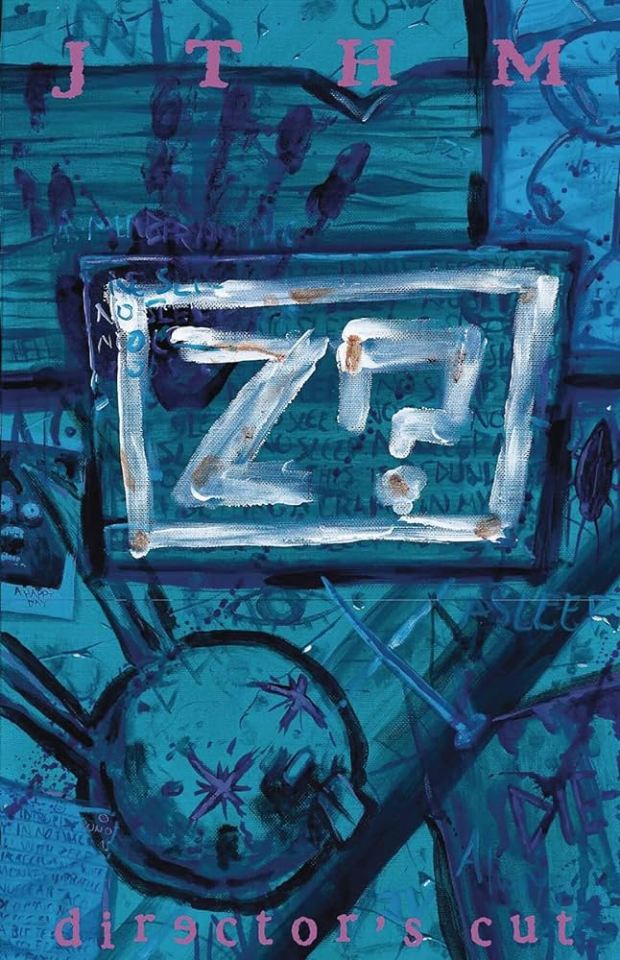
Johnny the Homicidal Maniac attempts to walk a fine line between satirizing revenge fantasies and indulging in them, but this duality often leaves the book feeling muddled. Vasquez introduces us to Johnny, the titular homicidal maniac, as a socially alienated, self-pitying character whose violent outbursts are triggered by trivial slights or perceived offenses. His victims are exaggeratedly vile, unrepentant individuals, seemingly crafted to evoke a sense of dark catharsis. Yet this makes it difficult to discern if Vasquez is critiquing Johnny’s outlook or, rather, inviting us to revel in the violence he enacts. The satire is further muddied by the fact that Johnny’s perspective and violent tirades aren’t challenged or balanced by the narrative; instead, they risk validating his nihilism.
Although Johnny briefly expresses disgust at a rapist’s crime and hints at awareness of his own monstrous nature, his moments of reflection come across as self-pity rather than genuine remorse. These half-hearted attempts at self-awareness fall short, making it difficult to sympathize with him. In other stories about morally flawed or self-deluded protagonists—like Taxi Driver’s Travis Bickle or American Psycho’s Patrick Bateman—there are layers to the characters’ actions and motivations, often tied to social or psychological commentary. For instance, Bickle’s flawed quest to "save" Iris is revealed as self-serving, and Bateman’s violent fantasies serve as outlets for his existential torment. In contrast, Johnny’s killing spree feels more like a visceral but empty reaction to everyday irritations, lacking depth or nuance.
Vasquez seems at least somewhat aware of the protagonist’s lack of appeal and attempts to inject self-parody through liner notes that poke fun at Johnny's self-aggrandizing tendencies. However, the satire is undermined when even supposedly sympathetic characters, like Devi (Johnny's ex-girlfriend) or Tess (a victim Johnny encounters), display the same arrogant contempt for others that Johnny does. Lines like Devi's, “I think it’s so sad when monkeys don’t know that they are the simple ones,” reveal a similar smug superiority. Tess, who is rescued from certain death by a stereotypical “jock” character, Krik, offers nothing but disdain for him, even as he risks his life to save her. Rather than fostering complexity, these characters’ shallow hostility only reinforces the comic’s bleak view of humanity, failing to provide any contrasting perspectives or empathy that might deepen the satire.
Visually, the art style leans on exaggerated grotesque imagery reminiscent of Ren and Stimpy with a dash of H.R. Giger, but lacks the craft of either. Characters are often drawn as claw-handed semi-stick figures, and the over-the-top grotesqueness feels like a cover for weak composition and inconsistent line work. This style occasionally suits the manic tone of the book but detracts from the visual storytelling, making it hard to take the violence or characters seriously.
Despite these issues, there are moments in Johnny the Homicidal Maniac that hint at an intriguing horror premise: Johnny, as a former artist whose creativity has been drained by a supernatural force, killing in a desperate attempt to regain inspiration. This concept, if further explored, might have lent more depth to Johnny’s motivations, creating a compelling horror story about the consequences of lost artistry and self-destruction.
Additionally, Vasquez shines in the one-page newspaper-style strips, where the comic’s dark humor and over-the-top violence are distilled into short, self-contained gags. These segments play to Vasquez’s strengths in absurdist humor and quick punchlines, making it clear that Johnny’s rants are overreactions to trivialities, rather than statements on society.
Ultimately, Johnny the Homicidal Maniac struggles to reconcile its satire of revenge fantasies with its indulgence in them. The comic has moments of humor and originality, especially in its shorter gag strips, but as a whole, it lacks the coherence and character complexity necessary to deliver a satisfying satire. Vasquez may have created a more engaging experience if he had leaned fully into a twisted comic strip format, focusing on humor over inconsistent attempts at social commentary.
#johnny the homicidal maniac#jthm nny#jthm johnny#jthm fandom#jthm#johnny c#nny#squee#jhonen vasquez#alternative#alternative comics#goth#alt aesthetic#alt art#comics#indie comix#indie comics#underground comix#underground#horror comics#90s commercials#90s comics#comic review#book review#review#comic books#black and white#black and white comics#invader zim
43 notes
·
View notes
Note
I want to ask your opinion on why Eddsworld beyond has felt so “off”
ok this is actually a very good question and the answer is this: uncanny valley.
Because we have 3 eras of Eddsworld to analyze. Original, Legacy, and now Beyond.
Legacy - animated (primarily) by Paul and written (primarily) by Tomska, it is easy to see the differences between it and the original Eddsworld in almost every aspect. The humor took a stark change from absurdist but dry comedy befitting of a British cartoon and veered into a more slap-stick/over-expressive comedy with the absurdity cranked up to 100, more befitting of American cartoons. This is unsurprising as Tomska himself has stated that he grew up watching American cartoons, thus it is easy to see where his inspirations and influences lie.
But Beyond is far closer to what Eddsworld Original was. Matt, the primary writer of Beyond, evidently has a much, much closer sense of humor to Edd than Tom did (this isn't a good or bad thing, it just explains why Beyond's writing is closer to the original than Legacy was). Couple that with the fact that Lopez, the primary animator, is trying very hard to emulate Edd's art style but has a very noticeable polish to it that Edd didn't (smear frames in place of tweening animation is one that really sticks out, steadier lines and higher frame count) and you have a recipe for a series that looks and plays out sort of like an Eddsworld episode but not quite.
Legacy was visually and structurally different and it didn't hide this fact. Of course this led to a lot of fights over the "quality" of the episodes, but the fact was, nobody I think was really arguing that Legacy looked or felt like original Eddsworld. It was clearly a different spin - Tomska's personal spin - on the Eddsworld formula. And for what it's worth, I think that was probably the smartest decision.
Beyond on the other hand is trying to emulate the original Eddsworld, or so it feels. I'm not gonna outright say Matt is trying his darnedest to copy the feel of Eddsworld original, because his style of writing could just genuinely be as we see it, much in the same way I won't argue that Tomska didn't at least try to make the Legacy episodes feel more "Eddsworld-y". But I think a lot of it comes down to what we see visually, and that being Edd's art style but in a way that's not very...well, Edd. And like, obviously, I don't expect anyone to be able to animate and draw the way Edd did. It's near impossible to copy anybody's style 1-to-1. Would it feel less uncanny if they created a new art style? Dunno.
I personally have mixed opinions on Beyond. So far from what I've seen, the highs have been really high, but the lows...ohh are they low. Unlike Legacy, which I considered to be pretty solid all throughout. No big highs and no low lows. It just stayed on a steady path thru its run.
#ironically casting call i think is the best beyond episode thus far#unironically very good#eddsworld#;asks
70 notes
·
View notes
Text
in response to this post:
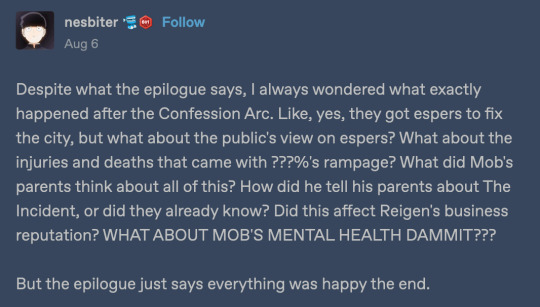
ONE-sensei is a bit of a troll, not gonna lie.
but... i actually like this ending, at least for comedy's sake. the stark juxtaposition of
'boy gets hit by a truck and his unexamined jungian shadow self flattens a city before he finally makes peace with it'
with
'and everything was just fine six months later'
is funnier than spelling out exactly how we get from point A to point B, because we KNOW — as the audience — that it wasn't 'just fine'. after everything we saw, how could it be?
subverted expectations underpin a lot of comedy, even dark comedy, especially absurdist comedy. MP100 is practically built on both. this story wrings a lot of humor out of sad, if not tragic, situations: witness shigeo's 'who told you you could pass out?!' after his home has been reduced to kindling. or ritsu's admission that he only recently stopped crying himself to sleep at night over his inability to bend spoons like his big brother. while he's letting shigeo know just how much he supposedly hates him in that alley.
not expanding upon the real-life consequences of said city-flattening is funny precisely because dropping 'i wrecked my hometown after nearly dying in a car accident on the way to ask out my crush when i was a teenager' in a conversation and just... leaving it there? would be fucking horrifying in real life. here, in the elastic magical-realist context of MP100, it's more darkly absurd than anything else...
more to your point, OP: in this particular series, ONE-sensei tells so much of this story by implication. the answers to some of your questions are in the text, only... alluded to.
this might get long. bear with me:
the fact that joseph from the government exists? and that he's an esper working in secret? implies that the knowledge of destructive espers might need to be concealed from the public at large, perhaps to prevent wide-scale panic or ostracism of espers themselves. i doubt the government was forthright with its citizens about the confession arc disaster or the actual cause, for the same reasons.
that suzuki's broadcast-hijacking world domination announcement is met with public disdain and ridicule, especially over social media? outside of our cast, no one actually takes his threat seriously until it happens. reigen's trash-talking claw's seventh division down to earth also shows how little respect espers who don't make themselves useful to society actually get here. he is, after all, just another member of the public.
that reigen agrees to take on haruaki amakusa as a client after the world domination arc in part because he's worried about losing business? people have begun to move away from seasoning city in the aftermath; whatever the threat amakusa's hyakki present, neutralizing them as soon as possible is best for reigen's continued financial health. i can see even more residents deciding they've had enough and leaving after shigeo's last brush with death. would you stay?
how many people know shigeo is connected to reigen, apart from the people they both know? out of his own inflated and fragile ego, reigen presents himself as a sole proprietor on his website; it doesn't seem his business or its reputation would be directly affected at all.
and the injuries caused? possible deaths? we get a taste: early on in chapter 100, several people are trapped and unable to move in a 地盤沈下 (jibánchinka, literally: 'land subsidence', which can apply to a sinkhole, a landslide...) shigeo has left in his wake. we only find out because a cop is being briefed on this and its cause while trying to detain the suspect for questioning.
but like all other bodily harm caused in this story, we aren't treated to the fallout. did the elderly ishiguro survive shou plowing him into the earth? did miyagawa die after teruki flipped his barrier onto him and broiled him in his own flames? did those high school bully boys live after shigeo cracked their heads open on the pavement like eggs? like, these are good questions. (i'm inclined to believe that all these people died, but many would call me harsh for saying that about an otherwise kind story. we never see them again, either way.)
shigeo actually has a healing factor of sorts; his jungian shadow self keeps plucking him from death's arms. we have no way of knowing if this is true for anyone else, because that isn't the story ONE wanted to tell. if nothing else, the mangaka's lack of desire to engage with this question of lethal consequences is at least consistent across MP100.
any questions that aren't answered either directly or that can't be answered by easy extrapolation can foster continued engagement with the material.
for example: we don't know what shigeo's parents think about much of anything in this story, besides how little they expect from him and how ritsu sets a standard they feel shigeo should live up to. this boy goes through hell multiple times and is never shown to confide in either of his parents about it, instead suffering in silence for some time until he finds someone he feels safe enough to talk to. all this gives me the distinct impression that shigeo just isn't that close to his mother or his father. i can understand why. it's actually kind of sad, even as readers' frustrated expectations of real-life parental involvement with — and confusion over — his and his brother's shenanigans also generate some dark humor.
this also establishes a precedent: since we never check in with them, by the time the confession arc rolls around, their opinion hardly matters. (but i'm sure someone has written a fic fleshing that out! i'm somewhat curious myself.)
#mob psycho#mob psycho 100#mp100#mp100 meta#shigeo kageyama#mp100 manga spoilers#confession arc#dramedy#magical realism#image description in alt#jungian shadow: the anime#ONE is a bit of a troll LOL#i like this ending though#you can fill in the blanks yourself#i feel like the absurdity of the entire situation is more apparent on the page#shigeo is an unreliable narrator#admittedly humor is subjective#one person's 'reducing the aftermath of a psychic catastrophe to a Noodle Incident is funny'#is another person's 'this is just lazy writing'#kageyama shigeo#分析
88 notes
·
View notes
Text
Horror Comedy of the day: Army of Darkness (1992)
1300 AD. England is at war between the forces of King Arthur and Henry the Red, and the hordes of the undead roam the Earth. In this perilous situation, a prophecy foretells of a savior that will fall from the sky and fight the evil deadites with the aid of the very cursed book that brought them to life, the Necronomicon Ex Mortis. A classic tale of heroics in the making… at least if it wasn’t for this savior being a time warped and VERY fed up Ash Williams, who’s quite done fighting these very same creatures in the XXth century, and just wants to go home. Yet since the two goals overlap (with the damn book being his key back home), will Ash be up to the task?
If Evil Dead 2 already had a lot of wacky humor, this one goes completely off the rails with some of the silliest of cartoony slapstick a live action movie could get away with, has a general sense of campiness, over the top camera work, flashy yet often POINTLESS acrobatics and charmingly low budget visual effects. But it's biggest quality may be its parodic take of an uber macho character of a loser protagonist. When push comes to shove Ash definitely can kick some ass and shows some marvelous displays of engineering to show he has brains, but he’s not really a role model and is VERY MUCH out of his depth in many places where it counts; somehow being simultaneously a hypercompetent badass who charms the ladies (quite literally) immediately… yet also an idiot who doesn’t really knows what he’s doing or where he’s going in life, often making things VERY much worse in the process.
All of that isn’t to say there isn’t some frightening moments of body horror (some of which are STILL played for comedy), and we can’t ignore that the deadites show some disturbing intentions (and actions) for their women captives. But overall the tone is so much more inclined for absurdist fun it’s no wonder that this movie is what put Ash Williams on the pop culture map.
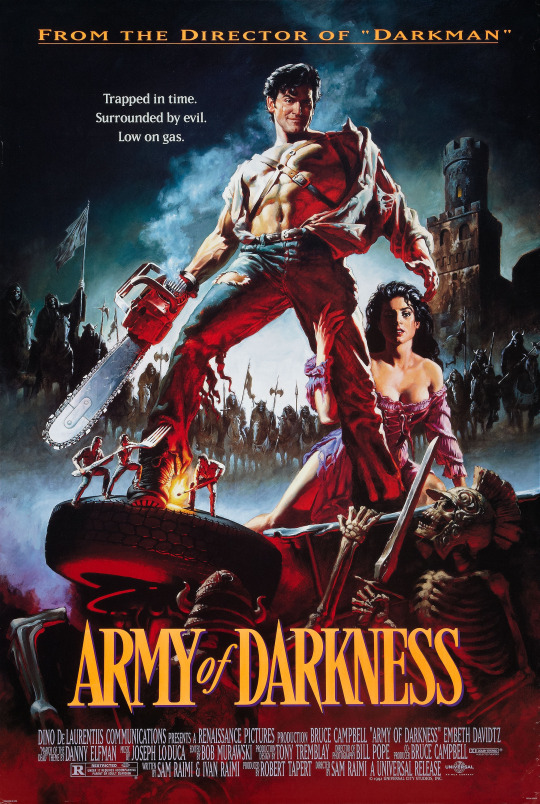
The film has at least four different cuts but really only two endings. And while one of them is certainly more depressing than the other (and the rest of the movie in general), I think it does feel appropriate for the character while also being the set up for a sequel that never got made. But you be the judge of that.
youtube
youtube
Also, fun fact: this movie was called Captain Supermarket in Japan. It makes more sense than you think (with Ash being wanting to return to his job at a supermarket and all) yet it also has the effect of making the movie sound even sillier. That’s totally a good thing.
#army of darkness#evil dead#horror movies#horror comedy#dark fantasy#sam raimi#bruce campbell#embeth davidtz#halloween movie#roskirambles#Youtube
3 notes
·
View notes
Text
EPISODE 1!!!!!!!!!!!!!!! THEY'RE BACK!!!!!
there in school again and Jesús hates it lol speaking of, everyone hates Joan~ lolol
AHHH THE BLEACHERS CREATURES NOTE!! Oh shit- its funnier than i expected heh, reminds me of Mikitaka honestly~~
Wait, so this guy isn't Malcom X? Then who tf is he? fr i didnt catch a word he said when he said his name..... I guess i'll be calling him Malcom X for the rest of this liveblog and when i finish ill check what his name really is lol, i really dont wanna spoil myself on this!
POINT! attention whore confucius my beloved~~, but let's see what this professor is all about...
Abe and JFK friendship! That sounds lovely and I sure don't care! But wish the best for them shippers! I'm also crossing my fingers! Teehee :3c
INTRO!! IT'S THE SAME AS BEFORE!! eh okay, kinda wanted it to change to reflect the current relationships but the only thing that should change is the parts with Joan, JFK and Abe so.... yeah its ok...
And Candide is the sole member of the board, yeah that makes sense lol, she also took vacation, haha "tanned"
GANDHI!!!!!! SXTREAM BLU!!! BEST DUDES 4EVER!!!! KNORK!!!! G-SPOT!!!!!! RAISINS!!!!!!! wait the retainers are actually Joan's...
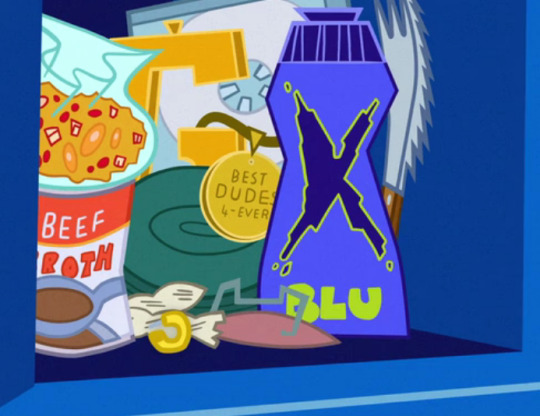
THE EAR PIERCING!!!!!!!!!!!
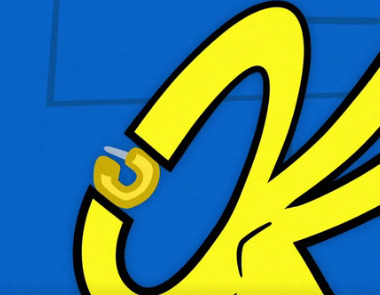
they were right, they really are teasing our cocks with gandhi what the fuck
HE'S HERE!!
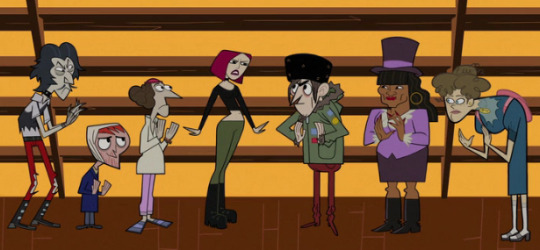
YEAH GIRL INTERRUPT THAT MUSICAL, NOBODY LIKES THAT SHIT HELL YEAH!!! and there are better people out there that can explain why Jackie is epic yoo
I just want more points jsksjksjksjsjsks
yeah "well funded" but............. oh cool a rocket! so it is true that theyll send them clone to space? :D
Wow Harriet being non-conformist by being conformist thats punk as hell man!
wait book burning? lmao- NOOOOO NOT THE FUCKING MAGNETS PRESENTATION AAAA BUT THE POINTSSSS NOW WE WILL NEVER KNOW HOW DO THEY WORK!!!!
oh but harriet/not malcom x apperantly? thats looking good so far ey
Hmm i still buy the theory that Exclamation! is in Nebraska
OH umm Mr B had a very smooth animation right there.....and yeah this whole scene is funny lolol glass ceiling
JFK being a jerk ass bully!!! Hell yeah!!!! :DDD
omg this is so funny cause like JUST THIS WEDNEDSDAY! JimmyHere did his ylyl vid of the week and in that vid he went to fact check about what happens if you eat a magnet! The answer being well yeah it wont kill you but ahahahha DONT DO IT MMMMM :))))
OH MOTHERFUCKER- QUE CONCHA DE SU MADRE JJAJAJJAJA me cae chistoso este profe, con que se la andara?
OYO THE TENSION! THAT YOUTUBE SOUND EFFECT!!
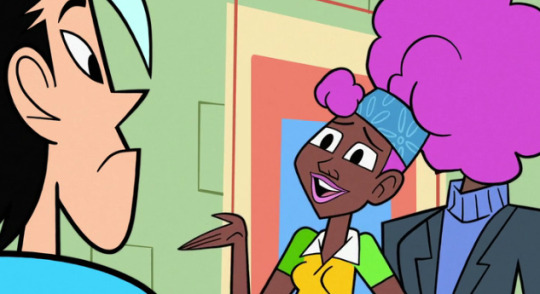
I LOVE IT!!!
HE'S BACK!!
I mean yeah, it makes sense that you choose a good color when you paint a wall, specially for vandalism purposes but ey look! a canon couple passed by when Joan and Topher were in close proximity to each other! that MUST mean something right?!
MOPED!! That's SO cool! they're going Downtown babey ;3 with- the massive helmet eheh WOAH THATS TIGHT ALRIGHTTT
BILL NYE THE SCIENCE LIEEEEE JSKSJSKJSKSSKSJKS ES EXCELENTE
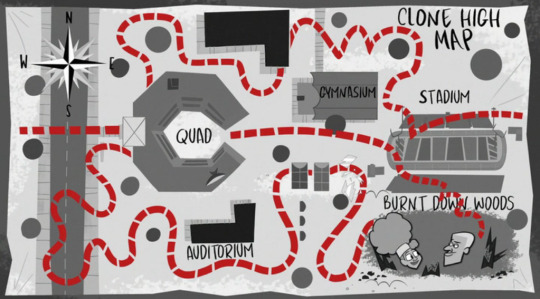
NADA QUE VER BOLUDAAAA NDEAAAAHHHH JSKSJKJSKSJKJS
AH BUENO EYE SEX REAL issss is this something the big mouth writers put on? ahahahhahhhhhh i want a word with them-
but does your eye got a boyfriend? WELL YEAH..........
.........
... eye got a boyfriend :v
sooo y'all just spray paint a wall? hmm ok, expecting future mischief to be more lethal next time~~
Oh so she call the feds first? hehehehhe

OHIO MENTIONED! IT HURTS TO BE THIS HIP
OOOHHHH ACCUSATIONS OF AFFAIRS~~
i love intentional animation inconsistencies uwu
OH NO ITS NOT SUNDAY OR HOLIDAYS!!!!!!
funny pose, and she's default posing lol, its kinda like the t-pose of flash/vector/2D animaion ;v

and the idea of having the idiot clone killed by their own idiocy is brilliant! BUt... his moment is over! a self contained story, what will happen next~?
oh so the sachel bleeds huh..... yknow itd be a lot funnier if humans didnt bleed but inanimate objects did, a bit of absurdist humor~~
lol suspect
Yaayyy Joan is part of the group and has friends and one of them is Topher, super important :D!
Rating: an aight start ^^/10!
Topher Bus has appeared on screen for 1:23 minutes (I'm not counting recaps or the intro)
#clone high#liveblogging#clone high season 3#so im actually not good at counting time so its aprox actually haha
7 notes
·
View notes
Text
small chainsaw man analysis
Chainsaw man will never be able to be correctly made into an anime because its art style fundamentally doesn't work animated. so much of the chainsaw man characterization and humor comes from fujimotos ability to draw exaggerated expressions and poses. And animation frankly can't capture it in the same exact way, it's too fast paced, too nuanced. The art style is much harder to translate to animation too, and ends up with these sort of results:
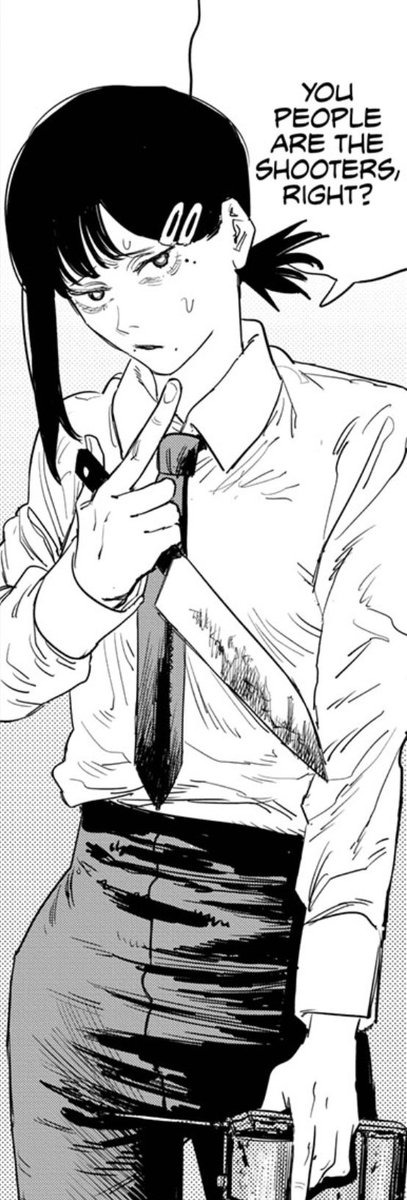
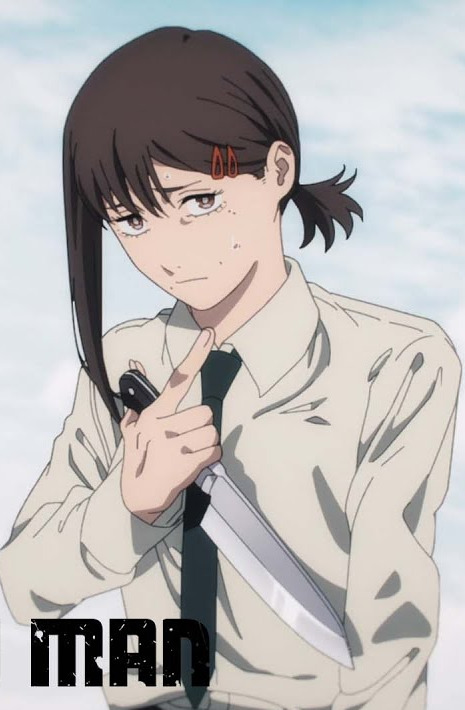
Kobeni ends up being much more round, with a fatter neck and rounder cheeks, thicker fuller less greasy hair, less disheveled, less.... everything that makes kobeni kobeni. and it's not exactly the animes fault, despite them making some choices i don't exactly understand. Her hair for example is much easier to look greasy and stringy if you're using hard blacks, but if you're coloring and shading with extremely thin lines, like the anime decided to, it's much harder to get that "stringy" look across withoiut it being deemed 'too unattractive' and there for not removed entirely. Heres another example
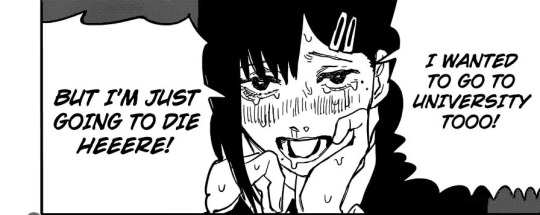

The expressions just don't translate. They've been too cutsie-ified, likely because a lot of the expressions in chainsaw man are hard to read, unpleasant to look at, and not very relatable, and they're fucking hard to animate i'm sure! But i think it deeply deeply damages the entire tone of the story; Chainsaw man is dramatic, it is, it's serious and dark, but the anime, likely due to the art direction, takes its self so so so seriously. I couldn't put a finger on why, but it's because they removed all of the vocal jokes, anything that would come off as goofy or non serious, Denji says in this very shadow the hedgehoggy weird serious boy voice. And I thought, thats okay, there isn't TOO much of that in the manga, and Denji frankly is a very sad character, i could dig this interpretation of him. Less silly, more serious, like he is at the end of the first series and the begining of the continuation.... but then I realized they removed ALL of the comedy, or at least a big chunk of it, and I couldn't figure out why? Why would they do that?
And then I realized it's the art style. There's no more silly expressions, or physical humor. The scene with Kobeni being called a monkey?

It's a joke. It's physical comedy, like a cartoon, it's absurdist humor because of Kobenis facial expressions, her generally disinterested and failgirl posture, the fact that the Kobeni we've known up until then was fucking pathetic as shit. And then she starts pulling this out of nowhere? That's the joke. That's what makes the monkey comment funny. But the issue is, the scene is so serious. It's so fast paced to try and get the effect the comic is going for, but i think it falls flat on its face. That was supposed to be a small comedic relief moment in a relatively serious scene, but without that physical humor, and with the line read of the "what is she, a monkey?!" line, he says it so seriously, there isn't any shock in his voice. It's more of a statement than anything. And without any of that- added without any of the verbal humor (other than power, but I have things to say about her in a different post) the entire anime feels so empty compared to the manga.
They're changing the chainsaw man director, for presumably, what I assume are these issues, especially the fact that a lot of the humor is just seemingly absent from the series. But I think an anime of chainsaw man is doomed to always be inferior, due to the fact that it is simply just not a series that works well for animation. The end bumpers are BEAUTIFUL, i think they perfectly encapture the feeling of chainsaw man, but i think thats the most you can do with animation. I don't think you can TELL the story of chainsaw man without Fujimotos art style, specifically his physical comedy and gags.
11 notes
·
View notes
Text
Yes, the 2007 Flatland film (specifically the Film, there were two movies for Flatland that came out in 2007, the other one is generally referred to as the movie, and it's even worse in this regard than the film) does glance in the direction of the politics, but the scene with the protestors is there and gone in the blink of an eye and is just there to be shocking and absurd in its brutality.
The film doesn't take the time to give us any in depth look at what they're protesting or why. It just shows them protesting and then shows them getting mowed down by the corporations.
That's not the same thing as actually taking a long hard look at the systems of inequality that the original book spends more than half its length criticizing. Yes, the women have their peace-cry, but that's...not the same thing as what the book does.
Especially because of the choice the creators made to set the entire history of Flatland in the film all at the same time, so that A Square is alive at the same time as Chromatistes and Pantocyclus. I already made a post talking about this, but just that alone weakens the grasp this film can have on the politics of the book.
It is not enough for a full-length film to glance in the direction of the politics of Flatland: A Romance of Many Dimensions in order to make absurdist shocking humor, it has to actually sit and interrogate them and *force the audience to reckon with them*.
Women using peace-cries and a half a minute scene showing that protestors exist in Spaceland doesn't mean the 2007 Flatland film should be exempt from this criticism. Half the original book is taken up by political commentary.
A few seconds here and there of absurdist humor doesn't erase the fact that 99% of the movie is dedicated solely to the interdimensional aspect and just being as absurdistly(?) funny as possible.
This meme and criticism 100% applies to the 2007 Flatland film among many others.
I don't even think it even acknowledged that women are property.
Edit August 20 2024: Ladd Ehlinger, the creator of the 2007 Flatland film, is disgustingly fucking racist and misogynistic. He is literally a proud conservative.
He made a political ad in 2011 that's literally so blatantly racist and misogynistic that youtube has literally restricted it so you literally cannot share the link outside of youtube.
Because it's that blatantly fucking bigoted.
I wish I could say I'm shocked but considering how terribly the 2007 film handles the themes of the original novel, I'm not surprised in the least.
The ad literally has Black men chanting, "give me your cash bitch so we can shoot up the street", while a white woman, with the face of the politician the add is against photoshopped over her, pole dances as a sex worker.
He runs a tumblr account so make sure you block him. His username is filmladd.
He's literally a racist misogynistic conservative.
For the love of all that's holy everyone please stop promoting this film immediately and make sure people are aware of exactly what kind of person produced it.
Flatland adaptations
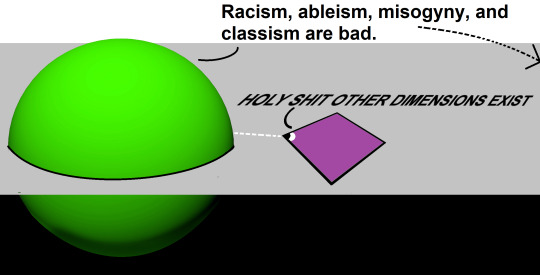
[ID: A version of the "missing the point", meme, showing a purple square shouting in all caps, Holy shit other dimensions exist", while staring at a green sphere that intersects with his plane, while the sphere says, with the words literally going over the square's head, "Racism, ableism, misogyny, and classism are bad.". End ID.]
how come I've watched three full length Flatland movies and many shorter animations but only one of them, which is in Italian, which I don't speak, ever has anything to say about the political themes of the book and instead just goes "woah cool interdimensional theory!"???
[John Crichton voice] Where's my damn political commentary?
Why do people want to just throw out all the criticism of systemic bigotry to focus only on the dimensional stuff?
296 notes
·
View notes
Text
Is Gus Fring Actually Gay?
//this is an article i wrote for a newspaper club im in, but the head of the club wont post it lol so im bringing it here. have fun tumblr//
Often, sexuality is not explicitly discussed in film or television. Romantic and implicitly sexual relationships occur frequently, but the label by which a character describes themself is almost never revealed on-screen. Thus, queer fans love to speculate, examining shows and movies scene by scene to uncover even the slightest hint of queerness, with even straight fans joining in on occasion. From the homosexuality of Stranger Things’ Mike Wheeler, to the aromanticism of One Piece’s Monkey D. Luffy, fans love to fill in the gaps that exist in representation of media.
Certain fandoms are more predisposed to this habit than others, though; shows and movies that frequently focus on light, cheerful moments leave more room for characters to display their relationships with one another, thus giving fans more material with which to speculate. Queer sects of fandoms also tend to indulge in this practice more often, as they more often than straight people tend to identify a character’s behavior as queer.
Two of the most recent shows to be subjected to this treatment are AMC’s Breaking Bad and its prequel counterpart Better Call Saul. While these shows can at times be humorous, they rarely focus on humor specifically, choosing rather to focus on drama and character development. They have also been a part of a relatively recent absurdist meme movement, in which the characters are depicted in situations that are edited or completely different from the original show. Interestingly enough many of the memes specifically involve homosexuality as part of the joke. For example, an audio that has been circulating recently involves a male character, Mike Ehrmantraut, telling another male character, Walter White, to put his dick away, as they won’t be having sex with each other at this moment. Another of such memes is a parody of a situation originally depicted in the show, in which Skyler White cheats on her husband with her boss, Ted Beneke, and tells her husband Walter in order to coerce him into honesty. The parody swaps the situation so that Walter cheats on Sklyer with their brother-in-law, Hank, in a homosexual relationship. The original point of the scene is not maintained, though, revealing this parody as no more than a silly joke about gay men.
Digressions and specificities aside, this absurdist trend of memes across the internet introduced many to the show, including but not limited to a fairly large queer audience. This audience, while understanding the intellectualities behind the plot and characterization of the show, have their fair share of fun in terms of humorizing the show, as mentioned previously, speculating about the sexualities of their favorite characters.
This is where we arrive at the subject of this essay, Gustavo Fring and his sexuality. What’s interesting to note is that Gus is largely excluded from the homosexual thread present in jokes made about the show, which can be said of no other male character. This is largely due to the fact that Gus’ sexuality is often the subject of a more serious debate among the fandom, that being whether or not he is homosexual. While evidence exists that Gus is at least romantically attracted to other men, the lack of an explicit declaration by Gus himself has left many fans doubting this line of thinking.
The debate originally began upon the airing of season four, episode eight, titled Hermanos, and the introduction of Gus’ business partner, Maximino Arciniega. The title of the episode is a reference to “Los Pollos Hermanos,” the chicken restaurant that Gus and Max started together as a front for their methamphetamine business. Their relationship stretches further back in time than the founding of the restaurant, though; they were both born in Chile, and after meeting in an unknown way, Gus paid for Max’s college education, an education which eventually earned him advanced degrees in biochemistry and chemical engineering. Such a financial investment seems extreme for a mere friend or even brotherly relationship.
Max’s introduction to the episode is a scene with him and Gus, a flashback to 1989 in which they discuss a possible business deal with the cartel leader Don Eladio. Max takes the lead in the conversation with Eladio, but the meeting eventually goes south, and Max is killed by an associate of Eladio’s, Hector Salamanca, right next to Gus. Gus, though, is spared, and by the beginning of the show, he had expanded “Los Pollos Hermanos” into the southern United States, along with his methamphetamine business, without the help of Max. Throughout season four of the show, Gus’ plot to exact revenge on Hector and the cartel for Max’s death acts as the driving force for his characterization.
His fixation on getting revenge for Max’s death implies a devotion deeper than that of friends, an implication that is only strengthened by Max’s few mentions in Better Call Saul. Once Gus became successful as the CEO and founder of “Pollos Hermanos,” he was able to establish a chemical engineering scholarship that shares the name of his murdered partner, and in season five episode five, titled Dedicato a Max, we are shown a fountain memorial which Gus built to honor Max’s death.
While we are never explicitly shown romantic affection being shared between Max and Gus, Gus’ fixation on Max after his death is telling of the true nature of their relationship. However, a homosexual relationship doesn’t necessarily need to occur for someone to be homosexual; Gus could have been romantically attracted to Max in an unrequited sense, never able to confess how he truly felt. This would explain his incredibly strong and persistent feelings towards Max even after his death, as he would have always felt like their relationship was unfulfilled.
While the relationship between Gus and Max is the main piece of evidence to suggest that Gus is homosexual, the main piece of opposing evidence is the supposed existence of his wife and kids. Throughout seasons three and four of Breaking Bad, Gus makes several mentions to Walter White about his wife and children, who are never shown on screen. His claim to have such a traditional nuclear family is supported by the presence of children’s toys in season three episode eleven, when Walter visits Gus’ home. However, in season four episode nine, when Jesse visits the same home to eat dinner with Gus, the toys are nowhere to be seen. This suggests that the toys and family were merely an elaborate ploy by Gus to further manipulate Walter into doing his bidding by suggesting that they understand each other. In fact, Better Call Saul suggests that Gus’ house itself may not even be his permanent or primary residence, as it is revealed to be heavily surveilled and to contain a network of secret tunnels.
With the secretive and secluded nature of Gus as a character, combined with the reluctance of popular media to explicitly explore queerness as a part of their stories, it’s not surprise that the audience never definitively learns whether or not Gus is gay. I tend to sympathize with queer people on the internet, as I myself am a queer person who is usually on the internet. With the ambiguity of this case in particular, it often feels as if the showrunners are teasing us with possible queerness and never actually delivering. At least, not delivering to those who aren’t willing to Google “Peter Gould Gus Fring gay”... you’re welcome.
33 notes
·
View notes
Text
Annette: The AD Devotee Review
So I saw Annette on its premiere night in Cannes and I’m still trying to process and make sense of those 2.5 hours of utter insanity. I have no idea where to begin and this is likely going to become an unholy length by the time I’m finished, so I apologize in advance. But BOY I’ve got a lot to parse through!!
Let’s start here: Adam’s made plenty of weird movies. The Dead Don’t Die? The Man Who Killed Don Quixote? There are definitely Terry Gilliam-esque elements of the unapologetically absurd and fantastical in Annette, but NOTHING comes close to this film. To put it bluntly, nothing I write in this post can prepare you for the eccentric phantasmagoria you’re about to sit through.
While the melodies conveying the story – at times lovely and haunting, at times whimsical, occasionally blunt and simple – add a unique sense of the surreal, the fact that it’s all presented in song somehow supplies the medium for this bizarre concoction of disparate elements and outlandish storytelling to all coalesce into a single genre-defying, disbelief-suspending whole. That’s certainly not to say there weren’t a few times when I quietly chortled to myself and mouthed “what the fuck” from behind my mask when things took an exceeding turn to the outrageous. This movie needs to be permitted a bit of leeway in terms of quality judgments, and traditional indicators certainly won’t apply. I would say part of its appeal (and ultimately its success) stems from its lack of interest in appealing to traditional arbiters of film structure and viewing experience. The movie lingers in studies of discomfiture (I’ll return to this theme); it presents all its absurdities with brazen pride rather than temperance; and its end is abrupt and utterly jarring. Yet somehow, at the end of it, I realized I’d been white-knuckling that rollercoaster ride the whole way through and loved every last twist and turn.
A note on the structure of this post before I dive in: I’ve written out a synopsis of the whole film (for those spoiler-hungry people) and stashed it down at the bottom of this post, so no one trying to avoid spoilers has to scroll through. If you want to read, go ahead and skip down to that before reading the discussion/analysis. If I have to reference a specific plot point, I’ll label it “Spoiler #___” and those who don’t mind being spoiled can check the correlating numbers in my synopsis to see which part I’m referencing. Otherwise, my discussion will be spoiler-free! I do detail certain individual scenes, but hid anything that would give away key developments and/or the ending.
To start, I’ll cut to what I’m sure many of you are here for: THE MUSICAL SEX SCENES. You want detailed descriptions? Well let’s fucking go because these scenes have been living in my head rent-free!!
The first (yes, there are two. Idk whether to thank Mr. Carax or suggest he get his sanity checked??) happens towards the end of “We Love Each Other So Much.” Henry carries Ann to the bed with her feet dangling several inches off the floor while she has her arms wrapped around his shoulders. (I maybe whimpered a tiny bit.) As they continue to sing, you first see Ann spread on her back on the bed, panting a little BUT STILL SINGING while Henry’s head is down between her thighs. The camera angle is from above Ann’s head, so you can clearly see down her body and exactly what’s going on. He lifts his head to croon a line, then puts his mouth right back to work.
And THEN they fuck – still fucking singing! They’re on their sides with Henry behind her, and yes there is visible thrusting. Yes, the thrusting definitely picks up speed and force as the song reaches its crescendo. Yes, it was indeed EXTREMELY sensual once you got over the initial shock of what you’re watching. Ann kept her breasts covered with her own hands while Henry went down on her, but now his hands are covering them and kneading while they’re fucking and just….. It’s a hard, blazing hot R rating. I also remember his giant hand coming up to turn her head so he can kiss her and ladkjfaskfjlskfj. Bring your smelling salts. I don’t recommend sitting between two older ladies while you’re watching – KINDA RUINED THE BLATANT, SMOKING HOT ADAM PORN FOR ME. Good god, choose your viewing buddy wisely!
The second scene comes sort of out of nowhere – I can’t actually recall which song it was during, but it pops up while Ann is pregnant. Henry is again eating her out and there’s not as much overt singing this time, but he has his giant hands splayed over her pregnant belly while he’s going to town and whew, WHEW TURN ON THE AIR CONDITIONING PLEASE. DID THE THEATER INCREASE IN TEMPERATURE BY 10 DEGREES, YOU’RE DAMN RIGHT IT DID.
Whew. I think you’ll be better primed to ~enjoy~ those scenes when you know they’re coming, otherwise it’s just so shocking that by the time you’ve processed “Look at Adam eating pussy with reckless abandon” it’s halfway over already. God speed, my fellow rats, it’s truly something to witness!!
Okay. Right. Ahem. Moving right on along….
I’ll kick off this discussion with the formal structure of the film. It’s honestly impossible to classify. I have the questionable fortune of having been taken to many a strange avant-garde operas and art exhibitions by my parents when I was younger, and the strongest parallel I found to this movie was melodramatic opera stagings full of flamboyant flourishes, austere set pieces, and prolonged numbers where the characters wallow at length in their respective miseries. This movie has all the elevated drama, spectacle, and self-aggrandizement belonging to any self-professed rock opera. Think psychedelic rock opera films a la The Who’s Tommy, Hair, Phantom of the Paradise, and hell, even Rocky Horror. Yes, this film really is THAT weird.
But Annette is also in large part a vibrant, absurdist performance piece. The film is intriguingly book-ended by two scenes where the lines blur between actor and character; and your own role blurs between passive viewer and interactive audience. The first scene has the cast walking through the streets of LA (I think?), singing “So May We Start?” directly to the camera in a self-aware prologue, smashing the fourth wall from the beginning and setting up the audience to play a direct role in the viewing experience. Though the cast then disburse and take up their respective roles, the sense of being directly performed to is reinforced throughout the film. This continues most concretely through Henry’s multiple stand-up comedy performances.
Though he performs to an audience in the film rather than directly to live viewers, these scenes are so lengthy, vulgar, and excessive that his solo performance act becomes an integral part of defining his character and conveying his arc as the film progresses. These scenes start to make the film itself feel like a one-man show. The whole shtick of Henry McHenry’s “Ape of God” show is its perverse irreverence and swaggering machismo. Over the span of what must be a five minute plus scene, Henry hacks up phlegm, pretends to choke himself with his microphone cord, prances across the stage with his bathrobe flapping about, simulates being shot, sprinkles many a misanthropic, charmless monologues in between, and ends by throwing off his robe and mooning the audience before he leaves the stage. (Yes, you see Adam’s ass within the film’s first twenty minutes, and we’re just warming up from there.) His one-man performances demonstrate his egocentrism, penchant for lowbrow and often offensive humor, and the fact that this character has thus far profited from indulging in and acting out his base vulgarities.
While never demonstrating any abundance of good taste, his shows teeter firmly towards the grotesque and unsanctionable as his marriage and mental health deteriorate. This is what I’m referring to when I described the film as a study in discomfiture. As he deteriorates, the later iterations of his stand-up show become utterly unsettling and at times revolting. The film could show mercy and stop at one to two minutes of his more deranged antics, but instead subjects you to a protracted display of just how insane this man might possibly be. In Adam’s hands, these excessive, indulgent performance scenes take on disturbing but intriguing ambiguity, as you again wonder where the performance ends and the real man begins. When Henry confesses to a crime during his show and launces into an elaborate, passionate reenactment on stage, you shift uncomfortably in your seat wondering how much of it might just be true. Wondering just how much of an animal this man truly is.
Watching this film as an Adam fan, these scenes are unparalleled displays of his range and prowess. He’s in turns amusing and revolting; intolerable and pathetic; but always, always riveting. I couldn’t help thinking to myself that for the casual, non Adam-obsessed viewer, the effect of these scenes might stop at crass and unappealing. But in terms of the sheer range and power of acting on display? These scenes are a damn marvel. Through these scenes alone, his performance largely imbues the film with its wild, primal, and vaguely menacing atmosphere.
His stand-up scenes were, to me, some of the most intense of the film – sometimes downright difficult to endure. But they’re only a microcosm of the R A N G E he exhibits throughout the film’s entirety. Let’s talk about how he’s animalistic, menacing, and genuinely unsettling to watch (Leos Carax described him as “feline” at some point, and I 100% see it); and then with a mere subtle twitch of his expression, sheen of his eyes, or slump of his shoulders, he’s suddenly a lost, broken thing.
Henry McHenry is truly to be reviled. Twitter might as well spare their breath and announce he’s already cancelled. He towers above the rest of the cast with intimidating, predatory physicality; he is prone to indulgence in his vices; and he constantly seems at risk of releasing some wild, uncontrollable madness lingering just beneath his surface. But as we all well know, Adam has an unerring talent for lending pathos to even the most objectively condemnable characters.
In a repeated refrain during his first comedy show, the audience keeps asking him, “Why did you become a comedian?” He dodges the question or gives sarcastic answers, until finally circling back to the true answer later in the film. It was something to the effect of: “To disarm people. It’s the only way I can tell the truth without it killing me.” Even for all their sick spectacle, there are also moments in his stand-up shows of disarming vulnerability and (seeming) honesty. In a similar moment of personal exposition, he confesses his temptation and “sympathy for the abyss.” (This phrase is hands down my favorite of the film.) He repeatedly refers to his struggle against “the abyss” and, at the same time, his perceived helplessness against it. “There’s so little I can do, there’s so little I can do,” he sings repeatedly throughout the film - usually just after doing something horrific.
Had he been played by anyone else, the first full look of him warming up before his show - hopping in place and punching the air like some wannabe boxer, interspersing puffs of his cigarette with chowing down on a banana – would have been enough for me to swear him off. His archetype is something of a cliché at this point – a brusque, boorish man who can’t stomach or preserve the love of others due to his own self-loathing. There were multiple points when it was only Adam’s face beneath the character that kept my heart cracked open to him. But sure enough, he wedged his fingers into that tiny crack and pried it wide open. The film’s final few scenes show him at his chin-wobbling best as he crumbles apart in small, mournful subtleties.
(General, semi-spoiler ahead as to the tone of the film’s ending – skip this paragraph if you’d rather avoid.) For a film that professes not to take itself very seriously (how else am I supposed to interpret the freaky puppet baby?), it delivers a harsh, unforgiving ending to its main character. And sure enough, despite how much I might have wanted to distance myself and believe it was only what he deserved, I found myself right there with him, sharing his pain. It is solely testament to Adam’s tireless dedication to breathing both gritty realism and stubborn beauty into his characters that Henry sank a hook into some piece of my sympathy.
Not only does Adam have to be the only actor capable of imbuing Henry with humanity despite his manifold wrongs, he also has to be the only actor capable of the wide-ranging transformations demanded of the role. He starts the movie with long hair and his full refrigerator brick house physique. His physicality and size are actively leveraged to engender a sense of disquiet and unpredictability through his presence. He appears in turns tormented and tormentor. There were moments when I found myself thinking of Conan the Barbarian, simply because his physical presence radiates such wild, primal energy (especially next to tiny, dainty Marion and especially with that long hair). Cannot emphasize enough: The raw sex appeal is off the goddamn charts and had me – a veteran fangirl of 3+ years - shook to my damn core.
The film’s progression then ages him – his hair cut shorter and his face and physique gradually becoming more gaunt. By the film’s end, he has facial prosthetics to make him seem even more stark and borderline sickly – a mirror of his growing internal torment. From a muscular, swaggering powerhouse, he pales and shrinks to a shell of a man, unraveling as his face becomes nearly deformed by time and guilt. He is in turns beautiful and grotesque; sensual and repulsive. I know of no other actor whose face (and its accompanying capacity for expressiveness) could lend itself to such stunning versatility.
Quick note here that he was given a reddish-brown birthmark on the right side of his face for this film?? It becomes more prominent once his hair is shorter in the film’s second half. I’m guessing it was Leos’ idea to make his face even more distinctive and riveting? If so, joke’s on you, Mr. Carax, because we’re always riveted. ☺
I mentioned way up at the beginning that the film is bookended by two scenes where the lines blur between actor and character, and between reality and performance. This comes full circle at the film’s end, with Henry’s final spoken words (this doesn’t give any plot away but skip to the next paragraph if you would rather avoid!) being “Stop watching me.” That’s it. The show is over. He has told his last joke, played out his final act, and now he’s done living his life as a source of cheap, unprincipled laughs and thrills for spectators. The curtain closes with a resounding silence.
Now, I definitely won’t have a section where I talk (of course) about the Ben Solo parallels. He’s haunted by an “abyss” aka darkness inside of him? Bad things happened when he finally gave in and stared into that darkness he knew lived within him? As a result of those tragedies, (SPOILER – Skip to next paragraph to avoid) he then finds himself alone and with no one to love or be loved by? NO I’M DEFINITELY NOT GOING TO TALK ABOUT IT AT ALL, I’M JUST FINE HERE UNDER MY MOUNTAINS OF TISSUES.
Let’s talk about the music! The film definitely clocks in closer to a rock opera than musical, because almost the entire thing is conveyed through ongoing song, rather than self-contained musical numbers appearing here and there. This actually helps the film’s continuity and pacing, by keeping the characters perpetually in this suspended state of absurdity, always propelled along by some beat or melody. Whenever the film seems on the precipice of tipping all the way into the bleak and dark, the next whimsical tune kicks in to reel us all blessedly back. For example, after (SPOILER #1) happens, there’s a hard cut to the bright police station where several officers gather around Henry, bopping about and chattering on the beat “Questions! We have a few questions!”
Adam integrates his singing into his performance in such a way that it seems organic. I realized after the film that I never consciously considered the quality of his singing along the way. For all that I talked about the film maintaining the atmosphere of a fourth wall-defying performance piece, Adam’s singing is so fully immersed in the embodiment of his character that you almost forget he’s singing. Rather, this is simply how Henry McHenry exists. His stand-up scenes are the only ones in the film that do frequently transition back and forth between speaking and singing, but it’s seamlessly par for the course in Henry’s bizarre, dour show. He breaks into his standard “Now laugh!” number with uninterrupted sarcasm and contempt. There were certainly a few soft, poignant moments when his voice warbled in a tender vibrato you couldn’t help noticing – but otherwise, the singing was simply an extension of that full-body persona he manages to convey with such apparent ease and naturalism.
On the music itself: I’ll admit that the brief clip of “We Love Each Other So Much” we got a few weeks ago made me a tad nervous. It seemed so cheesy and ridiculous? But okay, you really can’t take anything from this movie out of context. Otherwise it is, indeed, utterly ridiculous. Not that none of it is ever ridiculous in context either, but I’m giving you assurances right now that it WORKS. Once you’re in the flow of constant singing and weirdness abound, the songs sweep you right along. Some of the songs lack a distinctive hook or melody and are moreso rhythmic vehicles for storytelling, but it’s now a day later and I still have three of the songs circulating pleasantly in my head. “We Love Each Other So Much” was actually the stand out for me and is now my favorite of the soundtrack. It’s reprised a few times later in the film, growing increasingly melancholy each time it is echoed, and it hits your heart a bit harder each time. The final song sung during (SPOILER #2), though without a distinctive melody to lodge in my head, undoubtedly left me far more moved than a spoken version of this scene would have. Adam’s singing is so painfully desperate and earnest here, and he takes the medium fully under his command.
Finally, it does have to be said that parts of this film veer fully towards the ridiculous and laughable. The initial baby version of the Annette puppet-doll was nothing short of horrifying to me. Annette gets more center-stage screen time in the film’s second half, which gives itself over to a few special effects sequences which look to be flying out at you straight from 2000 Windows Movie Maker. The scariest part is that it all seems intentional. The quality special effects appear when necessary (along with some unusual and captivating time lapse shots), which means the film’s most outrageous moments are fully in line with its guiding spirit. Its extravagant self-indulgence nearly borders on camp.
...And with that, I’ve covered the majority of the frantic notes I took for further reflection immediately after viewing. It’s now been a few days, and I’m looking forward to rewatching this movie when I can hopefully take it in a bit more fully. This time, I won’t just be struggling to keep up with the madness on screen. My concluding thoughts at this point: Is it my favorite Adam movie? Certainly not. Is it the most unforgettable? Aside from my holy text, The Last Jedi, likely yes. It really is the sort of thing you have to see twice to even believe it. And all in all, I say again that Adam truly carried this movie, and he fully inhabits even its highest, most ludicrous aspirations. He’s downright abhorrent in this film, and that’s exactly what makes him such a fucking legend.
I plan to make a separate post in the coming days about my experience at Cannes and the Annette red carpet, since a few people have asked! I can’t even express how damn good it feels to be globetrotting for Adam-related experiences again. <3

Thanks so much for reading! Feel free to ask me any further questions at all here or on Twitter! :)
*SYNOPSIS INCLUDED BELOW. DO NOT READ FURTHER IF AVOIDING SPOILERS!*
Synopsis: Comedian Henry McHenry and opera singer Ann Defrasnoux are both at the pinnacle of their respective success when they fall in love and marry. The marriage is happy and passionate for a time, leading to the birth of their (puppet) daughter, Annette. But tabloids and much of the world believe the crude, brutish Henry is a poor match for refined, idolized Ann. Ann and Henry themselves both begin to feel that something is amiss – Henry gradually losing his touch for his comedy craft, claiming that being in love is making him ill. He repeatedly and sardonically references how Ann’s opera career involves her “singing and dying” every night, to the point that he sees visions of her “dead” body on the stage. Meanwhile, Ann has a nightmare of multiple women accusing Henry of abusive and violent behavior towards them, and she begins growing wary in his presence. (He never acts abusively towards her, unless you count that scene when he tickles her feet and licks her toes while she’s telling him to stop??? Yeah I know, WILD.)
The growing sense of unease, that they’re both teetering on the brink of disaster, culminates in the most deranged of Henry’s stand-up comedy performances, when he gives a vivid reenactment of killing his wife by “tickling her to death.” The performance is so maudlin and unsettling that you wonder whether he’s not making it up at all, and the audience strongly rebukes him. (This is the “What is your problem?!” scene with tiddies out. The full version includes Adam storming across the stage, furiously singing/yelling, “What the FUCK is your problem?!”) But when Henry arrives home that night, drunk and raucous, Ann and Annette are both unharmed.
The couple take a trip on their boat, bringing Annette with them. The boat gets caught in a storm, and Henry drunkenly insists that he and Ann waltz in the storm. She protests that it’s too dangerous and begs him to see sense. (SPOILER #1) The boat lurches when Henry spins her, and Ann falls overboard to her death. Henry rescues Annette from the sinking boat and rows them both to shore. He promptly falls unconscious, and a ghost of Ann appears, proclaiming her intention to haunt Henry through Annette. Annette (still a toddler at this point and yes, still a wooden puppet) then develops a miraculous gift for singing, and Henry decides to take her on tour with performances around the world. He enlists the help of his “conductor friend,” who had been Ann’s accompanist and secretly had an affair with her before she met Henry.
Henry slides further into drunken debauchery as the tour progresses, while the Conductor looks after Annette and the two grow close. Once the tour concludes, the Conductor suggests to Henry that Annette might be his own daughter – revealing his prior affair with Ann. Terrified by the idea of anyone finding out and the possibility of losing his daughter, Henry drowns the Conductor in the pool behind his and Ann’s house. Annette sees the whole thing happen from her bedroom window.
Henry plans one last show for Annette, to be held in a massive stadium at the equivalent of the Super Bowl. But when Annette takes the stage, she refuses to sing. Instead, she speaks and accuses Henry of murder. (“Daddy kills people,” are the actual words – not that that was creepy to hear as this puppet’s first spoken words or anything.)
Henry stands trial, during which he sees an apparition of Ann from when they first met. They sing their regret that they can’t return to the happiness they once shared, until the apparition is replaced by Ann’s vengeful spirit, who promises to haunt Henry in prison. After his sentencing (it’s not clear what the sentence was, but Henry definitely isn’t going free), Annette is brought to see him once in prison. Speaking fully for the first time, she declares she can’t forgive her parents for using her: Henry for exploiting her voice for profit and Ann for presumably using her to take vengeance on Henry. (Yes, this is why she was an inanimate doll moving on strings up to this point – there was some meaning in that strange, strange artistic choice. She was the puppet of her parents’ respective egotisms.) The puppet of Annette is abruptly replaced by a real girl in this scene, finally enabling two-sided interaction and a long-missed genuine connection between her and Henry, which made this quite the emotional catharsis. (SPOILER #2) It concludes with Annette still unwilling to forgive or forget what her parents have done, and swearing never to sing again. She says Henry now has “no one to love.” He appeals, “Can’t I love you, Annette?” She replies, “No, not really.” Henry embraces her one last time before a guard takes her away and Henry is left alone.
…..Yes, that is the end. It left me with major emotional whiplash, after the whole film up to this point kept pulling itself back from the total bleak and dark by starting up a new toe-tapping, mildly silly tune every few minutes. But this last scene instead ends on a brutal note of harsh, unforgiving silence.
BUT! Make sure you stick around through the credits, when you see the cast walking through a forest together. (This is counterpart to the film’s opening, when you see the cast walking through LA singing “So May We Start?” directly to the audience) Definitely pay attention to catch Adam chasing/playing with the little girl actress who plays Annette! That imparts a much nicer feeling to leave the theater with. :’)
112 notes
·
View notes
Note
Hey, I was wondering if you have a book rec
!!
Okay so in full disclosure, I have a really hard time reading books. My brain sometime around six years ago just decided that wasn't its style anymore, so I don't read a TON. A lot of these aren’t going to be recent releases. However, here are a bunch of books I would absolutely recommend checking out! I tried to include a variety of genres but I have uh.....five bookshelves in my apartment so if you're looking for more of a certain genre let me know!
Theatre:
Rosencrantz and Guildenstern are Dead - Tom Stoppard
Waiting for Godot - Samuel Beckett
These are my two favorite plays - they're both absurdist, humorous, and have some fun things to say. They’re both by old white guys but like....I love both Tom Stoppard and Samuel Beckett DEEPLY and they have all of my love and respect.
Non-Fiction/Educational:
Why are all the Black Kids Sitting Together in the Cafeteria by Beverly Daniel Tatum - this is considered a 'classic' on the psychology of racism, and was particularly helpful for me as a white person in arming myself against 'reverse racism' thoughts and in dissembling my own prejudices. This is mostly a rec for other white folks, but Tatum also addresses 'having the courage to sit at the black table' as a way of claiming your own identity outside of the stereotypes the dominant society expects of you.
Daring Greatly by Brene Brown - Okay listen I just really REALLY love Brene Brown, she is a therapist most famous for her TED talk about Vulnerability and this is just...listen I really like to read this book when I am sad and feel like shit because it makes me feel strong. I reread this book at least once a year.
Imagined Communities by Benendict Anderson - This is an absolutely fascinating read on the rise of nationalism. It’s a bit dry and wordy, but the ideas and use of history as propaganda, spinning the story of a nation to pit it against or on the same side as other nations, and the ways in which these tactics shaped cultural history is just!!!! Amazing.
Gay New York by George Chauncey - This is just one of the most informative and interesting reads of queer history in New York that I’ve ever come across. It’s one of the ‘must reads’ of queer history and has so many interesting tidbits that I have to recommend it. It’s a bit old(published in 1994) but I still find it relevant and interesting to read.
Personal Fiction/Autobiographical Fiction
White Girls by Hilton Als - I went to a reading of this book when it first came out. It was so much fun and so eye-opening for me as a baby queer in NYC that I bought the book there. I wanna be really clear that Als does not pull punches and a lot of people don’t quite like it, but I love Als’ style of writing. The stories and essays in this book are amazing and funny and heartbreaking and informative of queer experience - particularly black queer experience - that I always feel like...honored? to experience through writing? This is one of those ‘you’re gonna suffer but you’re gonna be happy about it’ reads - it can be hard to face because of how very hard the pills are to swallow but like....gosh I just love this book and it’s interesting and hilarious and great.
Confessions of an Economic Hitman by John Perkins - this is my tin hat favorite. It hits....ugh. This is one of those books that came out and like every government agency freaked the fuck out over it. It’s an interesting look into the quote-unquote dark underbelly of capitalism; how and why countries manipulate each other through economic policies. Super interesting read with a nice style of prose.
The Know-It-All: One Man's Humble Quest to become the Smartest Person in the World by A.J. Jacobs Okay so full disclosure I have not finished reading this, but I’m far enough through to rec it. This book chronicles the author’s attempt to read the entire Encyclopedia Brittanica from front to back, and it is just as kooky and hilarious as it sounds. I am very incredibly and deeply offended this author stole both my schtick and my initials, thereby preventing me from doing this exact thing. I read through the phone book in its entirety when I was three. I had it in me. Anyway, this is basically the author just listing weird interesting facts he’s read about and connecting them to his daily life, but it’s a fun read, and you learn a lot of totally useless facts, which is absolutely my jam.
When Skatboards Will Be Free by Saïd Sayrafiezadeh - HI I LOVE THIS BOOK. I’ve read it maybe three times over. It’s so fun and interesting. You may notice that a lot of the books I rec are very absurdist in their humor, and this is no exception. This book is full of the dry wit and just weird goddamn shit you could only expect from the child of a revolution that never came. You want to read a book about someone who Went Through Shit? Read this book. It’s funny and heartbreaking and just. AHHHH. Seriously I cannot recommend this enough.
Hyperbole and a Half by Allie Brosch - FIGHT ME ON THIS. I love this book.....so much. Yes it’s technically a comic book but the stories are so INTERESTING and hilarious and full of exactly the dry absurdist humor I eat the fuck up. Also! Allie Brosch recently released a sequel of sorts called Solutions and Other Problems that I recommend without even reading it.
Poetry
Pansy by Andrea Gibson - IF YOU ARE NOT READING THE POETRY OF ANDREA GIBSON WHAT ARE YOU EVEN DOING WITH YOUR LIFE. I cried seven times reading this book. There are only like 14 poems. Please please read this to break your own queer heart :)
Bloodsport by Yves Olade - This is a tiny book full of absolutely devastating poetry. Most of it has to do with the grief of relationships, but like....gosh I love all of Olade’s stuff. (Also!! This is available as a pay-what-you-wish pdf!!)
Bright Dead Things by Ada Limón - This book focuses a lot on the author’s experiences of loss, and knowing that loss is going to happen. I’m completely devastated every time I read this.
Science Fiction/Fantasy
The Bartimeaus Sequence by Jonathan Stroud - So what if I am a dumb millennial I love this series. It’s another dry and deadpan humor, with weird additions and Stroud’s use of footnotes to absolutely crack me the fuck up means I gotta rec this. I just gotta. Four(I think?) books following the deeply unlikeable Nathaniel and his Djinn Bartimaeus, who just wants to eat humans and have a deeply enjoyable enemies to lovers plotline with his arch rival.
The Magic's Price Trilogy by Mercedes Lackey - Okay I know I’ve recced this before. I will rec it again. This was the very first series I ever read that featured a gay protagonist and I was. Devastated? Reformed? I latched onto Vanyel Ashkevron and I am never letting this depressed emo boy go. Try me, I bite. Seriously, this book was released in the 80s and yet it is still relevant, I still cry - god i LOVE this series SO MUCH. And, MERCEDES LACKEY actually invented unbury your gays, sorry I make the rule on that one. :) Also there are magic talking horses??????? Seriously please read this series I love it so much.
Fire Bringer & The Sight by David Clement-Davies - This is another series that was absolutely formative in my baby lexicon. These are books about magical animals and their inner societal workings and both books address the ideas of good, evil, darkness, compassion and good will, and destiny. I am obsessed with these books, they are some of the most interesting of the genre I’ve read, and so incredibly intricately written. LOVE these books.
Vampire Earth Series by E. E. Knight - The Witcher before it was cool. Sort of but like...there are schools of Cat, Bear, etc and it has COOL VAMPIRES I LOVE THSI SERIES. Basically, earth has been taken over by a race of alien ‘Vampires’ and follows a human involved in the resistance. The writing in this series is...wow. It’s so intricate and interesting and involved. I own the whole series because I love it so much, including the after-series hardback novels. I’m so messy and I love it.
Kindred by Octavia Butler - You know how people are like ‘YOU SHOULD READ OCTAVIA BUTLER!!’ ? You should absolutely do that. This novel is mindblowing and interesting and the pace and narrative are so so so interesting. Heartbreaking, god, horrific. Butler is an amazing writer and this novel, while my personal favorite, is not by any means the only of her books I would recommend. STORIES. STORIES!!!!!!!
Fiction
The Ballad of Barnabas Pierkiel: A Novel by Magdalena Zyzak - This book is so fucking good. It’s imaginative, funny, intelligent....it’s honestly one of the best fiction novels I’ve ever read. Again, dry, absurdist humor, this book sort of reminds me of Terry Pratchett’s style of writing.
The Call of the Wild by Jack London - This is a classic, a true classic. The social commentary of this book is so so good, London’s style flows and, personally, as a dog and animal expert, the anthropomorphisation of Buck and his fellow animals is just so well done. I love this book, it’s quite an easy read, and I reread it at least once a year.
Rolling the R's by R. Zamora Linmark - Okay. Okay okay!!!!!! I gotta take a deep breath about this one. This book is. Yuh. This is a bit younger leaning than the other fictions, focusing almost entirely on high school level characters, however the experiences and commentary is just so so good. Focusing on a diverse group of characters growing up in Hawaii in the 1970′s, this book addresses the intersectionalities of gender, sexuality, race, immigration, education, and how we define who we are. I’m obsessed.
A Separate Peace by John Knowles - A heartbreaking novel about war, innocence, adolescence, and how we hide from our truths. It’s...so good, this book hurts me a LOT okay. The prose is phenomenal, the story is poignant, and it feels like I’m ripping my own heart out with a fishhook every time I finish it.
The Toss of a Lemon by Padma Viswanathan - This is one of those books I half recommend because it’s so good, and half because of the deep wealth of knowledge it presents the reader. The author’s use of her own culture is just....goddddddddd. Intricate and interesting and so delicately included in the narrative that you can feel the love the author has for it. It’s a long read and it took me almost a month to get through reading every day, but god. It’s so soft and amazingly written I both wanted to read it all at once and take my time with it. This is another one that deals with the duality of humanity and how we connect with one another. Ahhhhhhhhh!!!!
P.S. Your Cat Is Dead by James Kirkwood Jr. - I love this book I love this book I LOVE THIS BOOK. It’s fucking hilarious, entertaining, I literally laughed out loud at every single chapter. Hilarious and poignant and surprisingly deep, this book literally follows the journey of a man in which literally everything that could go wrong does. It’s fucking hilarious.
I hope that helped and gave you some new books!!! <3
40 notes
·
View notes
Text
TV I Liked in 2020
Every year I reflect on the pop culture I enjoyed and put it in some sort of order.
Was there ever a year more unpredictably tailor-made for peak TV than 2020? Lockdowns/quarantines/stay-at-home orders meant a lot more time at home and the occasion to check out new and old favorites. (I recognize that if you’re lucky enough to have kids or roommates or a S.O., your amount of actual downtime may have been wildly different). While the pandemic resulted in production delays and truncated seasons for many shows, the continued streaming-era trends of limited series and 8-13 episode seasons mean that a lot of great and satisfying storytelling still made its way to the screen. As always, I in no way lay any claims to “best-ness” or completeness – this is just a list of the shows that brought me the most joy and escapism in a tough year and therefore might be worth putting on your radar.
10 Favorites
10. The Right Stuff: Season 1 (Disney+)
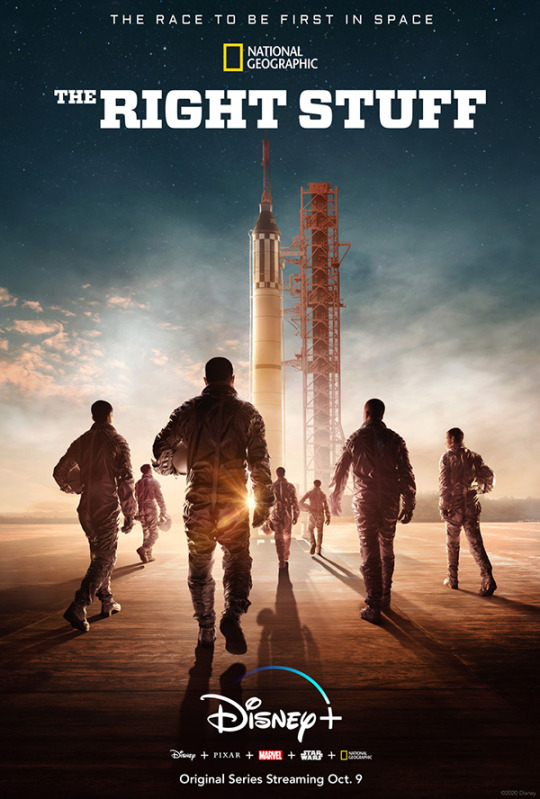
As a space program enthusiast, even I had to wonder, does the world really need another retelling of NASA’s early days? Especially since Tom Wolfe’s book has already been adapted as the riveting and iconoclastic Philip Kaufman film of the same name? While some may disagree, I find that this Disney+ series does justify its existence by focusing more on the relationships of the astronauts and their personal lives than the technical science (which may be partially attributable to budget limitations?). The series is kind of like Mad Men but with NASA instead of advertising (and real people, of course), so if that sounds intriguing, I encourage you to give it a whirl.
9. Fargo: Season 4 (FX)
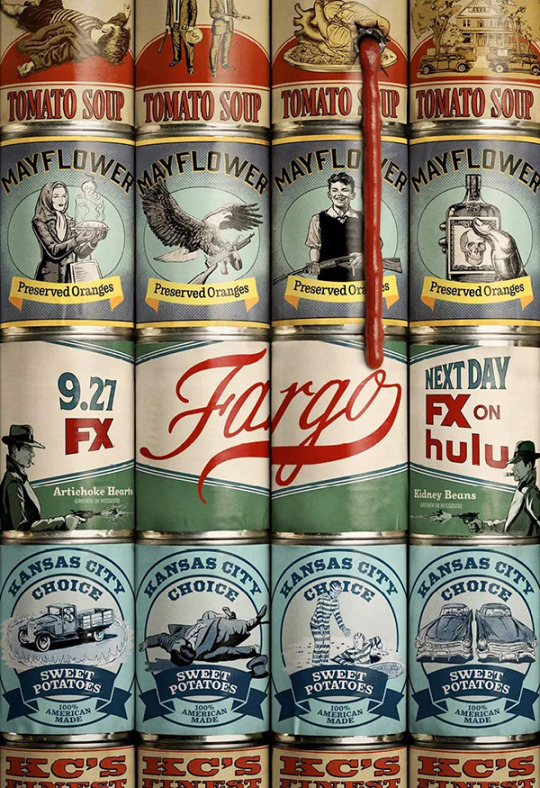
As a big fan of Noah Hawley’s Coen Brothers pastiche/crime anthology series, I was somewhat let down by this latest season. Drawing its influence primarily from the likes of gangster drama Miller’s Crossing – one of the Coens’ least comedic/idiosyncratic efforts – this season is more straightforward than its predecessors and includes a lot of characters and plot-threads that never quite cohere. That said, it is still amongst the year’s most ambitious television with another stacked cast, and the (more-or-less) standalone episode “East/West” is enough to make the season worthwhile.
8. The Last Dance (ESPN)
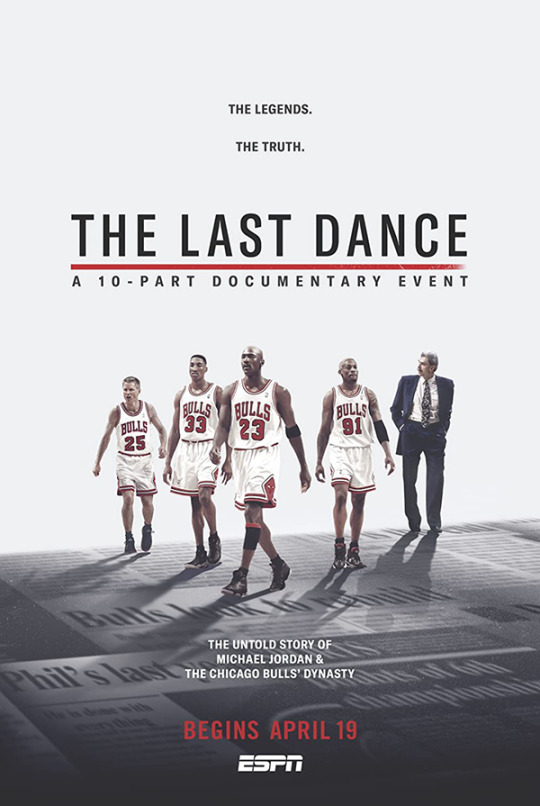
Ostensibly a 10-episode documentary about the 1990s Chicago Bulls’ sixth and final NBA Championship run, The Last Dance actually broadens that scope to survey the entire history of Michael Jordan and coach Phil Jackson’s careers with the team. Cleverly structured with twin narratives that chart that final season as well as an earlier timeframe, each episode also shifts the spotlight to a different person, which provides focus and variety throughout the series. And frankly, it’s also just an incredible ride to relive the Jordan era and bask in his immeasurable talent and charisma – while also getting a snapshot of his outsized ego and vices (though he had sign-off on everything, so it’s not exactly a warts-and-all telling).
7. The Queen’s Gambit (Netflix)

This miniseries adaptation of the Walter Tevis coming-of-age novel about a chess prodigy and her various addictions is compulsively watchable and avoids the bloat of many other streaming series (both in running time and number of episodes). The 1960s production design is stunning and the performances, including Anya Taylor-Joy in the lead role, are convincing and compelling.
6. The Great: Season 1 (hulu)
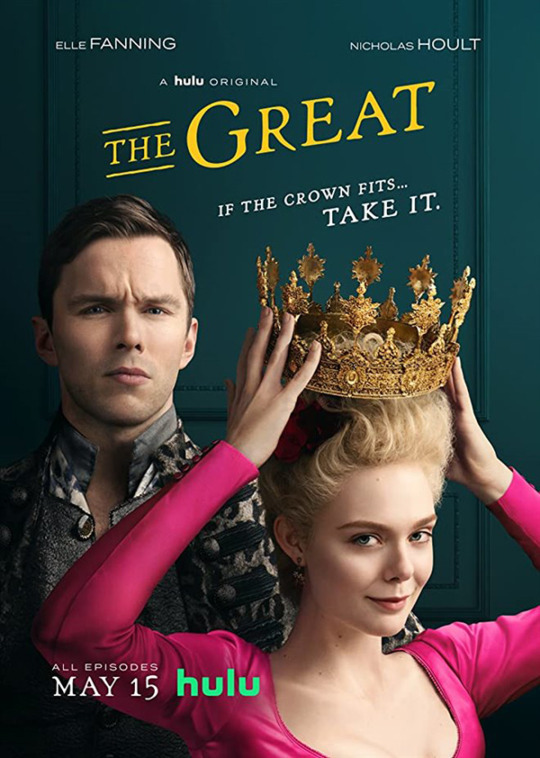
Much like his screenplay for The Favourite, Tony McNamara’s series about Catherine the Great rewrites history with a thoroughly modern and irreverent sensibility (see also: Sofia Coppola’s Marie Antoinette). Elle Fanning brings a winning charm and strength to the title role and Nicholas Hoult is riotously entertaining as her absurdly clueless and ribald husband, Emperor Peter III. Its 10-episodes occasionally tilt into repetitiveness, but when the ride is this fun, why complain? Huzzah!
5. Dispatches From Elsewhere (AMC)
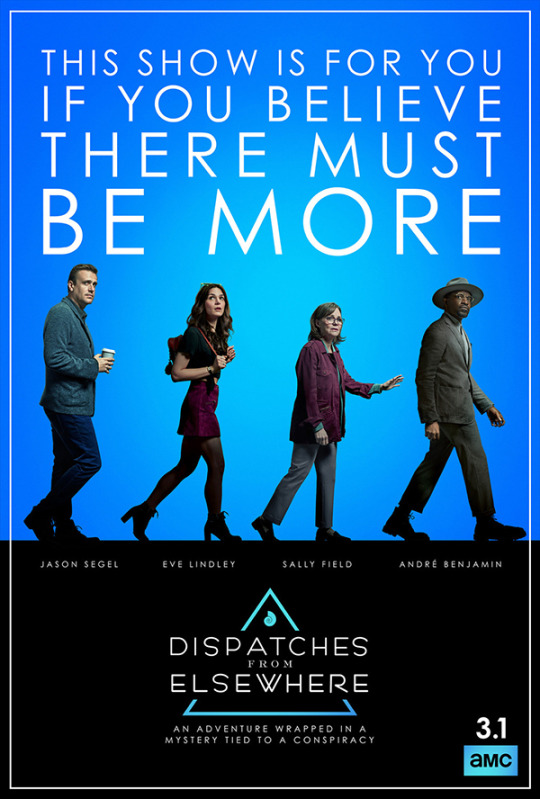
A limited (but possibly anthology-to-be?) series from creator/writer/director/actor Jason Segal, Dispatches From Elsewhere is a beautiful and creative affirmation of life and celebration of humanity. The first 9 episodes form a fulfilling and complete arc, while the tenth branches into fourth wall-breaking meta territory, which may be a bridge too far for some (but is certainly ambitious if nothing else). Either way, it’s a movingly realized portrait of honesty, vulnerability and empathy, and I highly recommend visiting whenever it inevitably makes its way to Netflix, or elsewhere…
4. What We Do in the Shadows: Season 2 (FX)
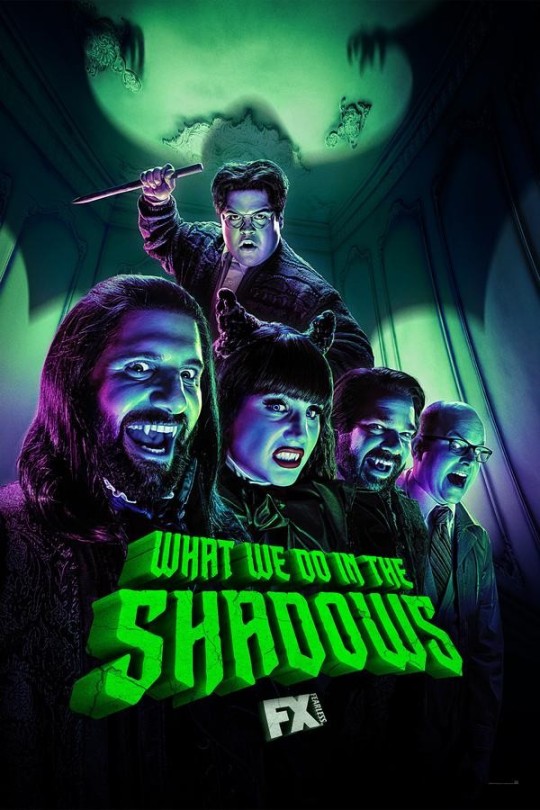
The second season of WWDITS is more self-assured and expansive than the first, extending a premise I loved from its antecedent film – but was skeptical could be sustained – to new and reinvigorated (after)life. Each episode packs plenty of laughs, but for my money, there is no better encapsulation of the series’ potential and Matt Berry’s comic genius than “On The Run,” which guest-stars Mark Hamill and features Laszlo’s alter ego Jackie Daytona, regular human bartender.
3. Ted Lasso: Season 1 (AppleTV+)
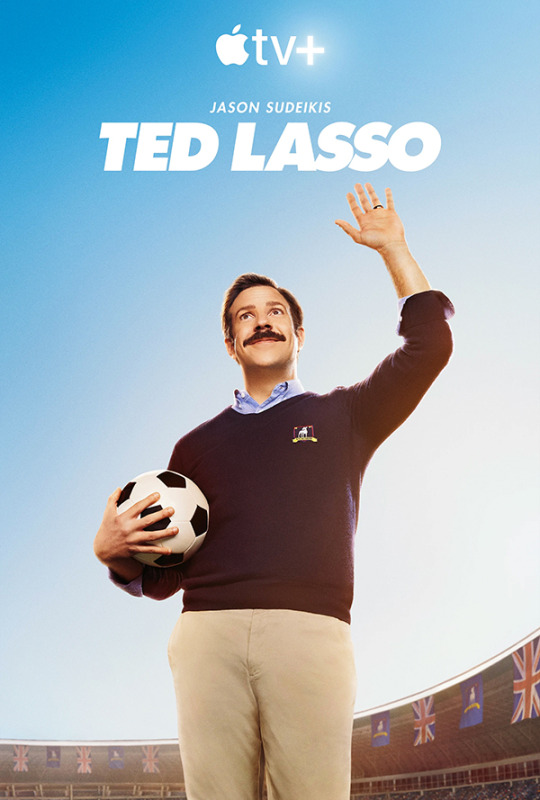
Much more than your average fish-out-of-water comedy, Jason Sudeikis’ Ted Lasso is a brilliant tribute to humaneness, decency, emotional intelligence and good coaching – not just on the field. The fact that its backdrop is English Premier League Soccer is just gravy (even if that’s not necessarily represented 100% proficiently). A true surprise and gem of the year.
2. Mrs. America (hulu)
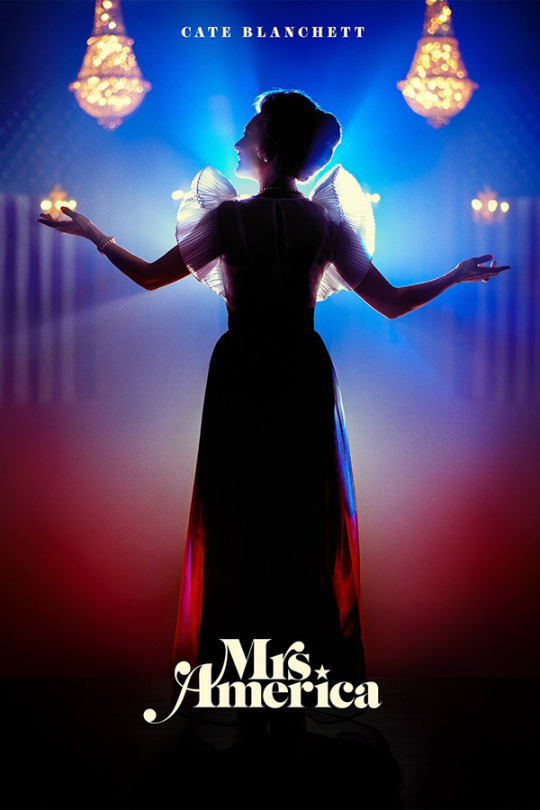
This FX miniseries explores the women’s liberation movement and fight for the Equal Rights Amendment in the 1970s and its opposition by conservative women including Phyllis Schlafly. One of the most ingenious aspects of the series is centering each episode on a different character, which rotates the point of view and helps things from getting same-y. With a slate of directors including Ryan Bowden and Anna Fleck (Half-Nelson, Sugar, Captain Marvel) and an A-List cast including Cate Blanchett, Rose Byrne, Uzo Aduba, Sarah Paulson, Margo Martindale, Tracey Ulman and Elizabeth Banks, its quality is right up there with anything on the big screen. And its message remains (sadly) relevant as ever in our current era.
1. The Good Place: Season 4 (NBC)
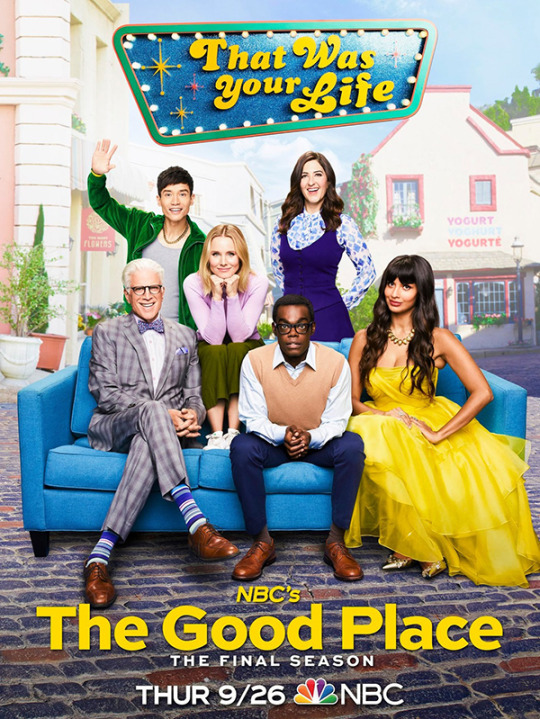
It was tempting to omit The Good Place this year or shunt it to a side category since only the final 4 episodes aired in 2020, but that would have been disingenuous. This show is one of my all-time favorites and it ended perfectly. The series finale is a representative mix of absurdist humor and tear-jerking emotion, built on themes of morality, self-improvement, community and humanity. (And this last run of eps also includes a pretty fantastic Timothy Olyphant/Justified quasi-crossover.) Now that the entire series is available to stream on Netflix (or purchase in a nice Blu-ray set), it’s a perfect time to revisit the Good Place, or check it out for the first time if you’ve never had the pleasure.
5 of the Best Things I Caught Up With
Anne With An E (Netflix/CBC)
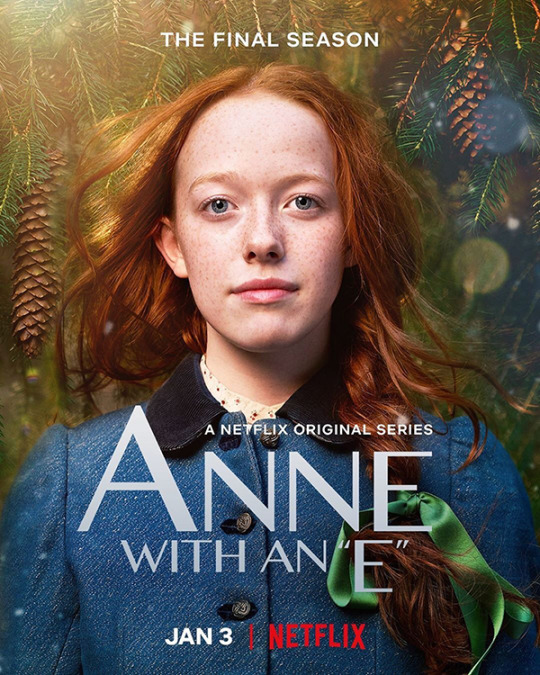
Another example of classic literature I had no prior knowledge of (see also Little Women and Emma), this Netflix/CBC adaptation of Anne of Green Gables was strongly recommended by several friends so I finally gave it a shot. While this is apparently slightly more grown-up than the source material, it’s not overly grimdark or self-serious but rather humane and heartfelt, expanding the story’s scope to include Black and First Nations peoples in early 1800s Canada, among other identities and themes. It has sadly been canceled, but the three seasons that exist are heart-warming and life-affirming storytelling. Fingers crossed that someday we’ll be gifted with a follow-up movie or two to tie up some of the dangling threads.
Better Call Saul (AMC)
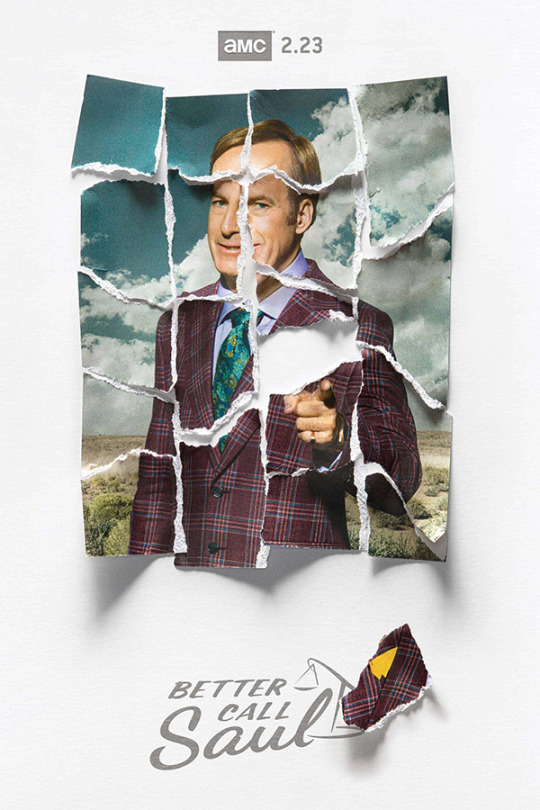
I liked Breaking Bad, but I didn’t have much interest in an extended “Breaking Bad Universe,” as much as I appreciate star Bob Odenkirk’s multitalents. Multiple recommendations and lockdown finally provided me the opportunity to catch up on this prequel series and I’m glad I did. Just as expertly plotted and acted as its predecessor, the series follows Jimmy McGill/Saul Goodman on his own journey to disrepute but really makes it hard not to root for his redemption (even as you know that’s not where this story ends).
Joe Pera Talks With You (Adult Swim)
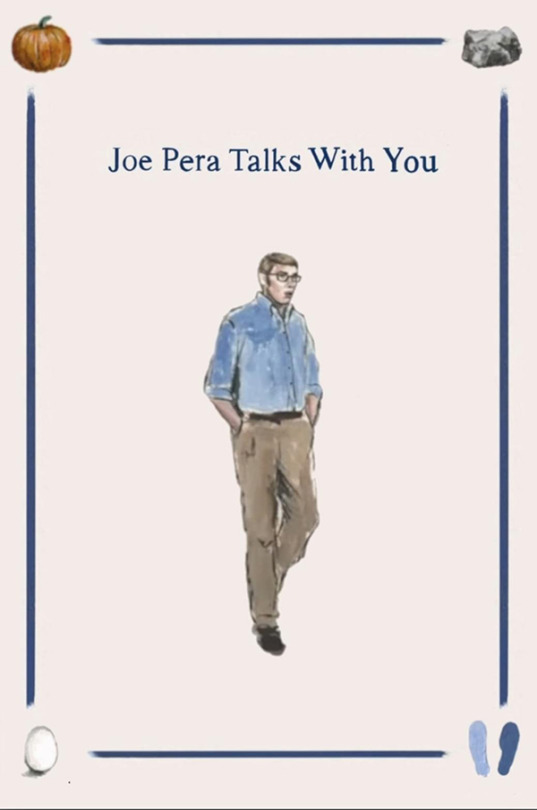
It’s hard to really describe the deadpan and oddly soothing humor of comedian Joe Pera whose persona, in the series at least, combines something like the earnestness of Mr. Rogers with the calm enthusiasm of Bob Ross. Sharing his knowledge on the likes of how to get the best bite out of your breakfast combo, growing a bean arch and this amazing song “Baba O’Reilly” by the Who – have you heard it?!? – Pera provides arch comfort that remains solidly on the side of sincerity. The surprise special he released during lockdown, “Relaxing Old Footage with Joe Pera,” was a true gift in the middle of a strange and isolated year.
The Mandalorian (Disney+)
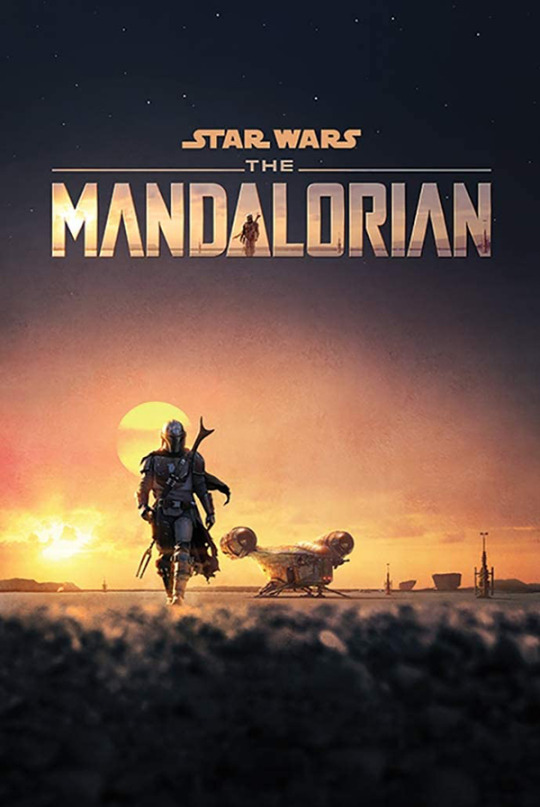
One of the few recent Star Wars properties that lives up to its potential, the adventures of Mando and Grogu is a real thrill-ride of a series with outstanding production values (you definitely want to check out the behind-the-scenes documentary series if you haven’t). I personally prefer the first season, appreciating its Western-influenced vibes and somewhat-more-siloed story. The back half of the second season veers a little too much into fan service and video game-y plotting IMHO but still has several excellent episodes on offer, especially the Timothy Olyphant-infused energy of premiere “The Marshall” and stunning cinematography of “The Jedi.” And, you know, Grogu.
The Tick (Amazon Prime)

I’ve been a fan of the Tick since the character’s Fox cartoon and indie comic book days and also loved the short-lived Patrick Warburton series from 2001. I was skeptical about this Amazon Prime reboot, especially upon seeing the pilot episode’s off-putting costumes. Finally gaining access to Prime this year, I decided to catch up and it gets quite good!, especially in Season 2. First, the costumes are upgraded; second, Peter Serafinowicz’s initially shaky characterization improves; and third, it begins to come into its own identity. The only real issue is yet another premature cancellation for the property, meaning Season 2’s tease of interdimensional alien Thrakkorzog will never be fulfilled. 😢
Bonus! 5 More Honorable Mentions:
City So Real (National Geographic)
The Good Lord Bird (Showtime)
How To with John Wilson: Season 1 (HBO)
Kidding: Season 2 (Showtime)
Unbreakable Kimmy Schmidt: Kimmy Vs The Reverend (Netflix)
11 notes
·
View notes
Note
Why do you think Tobias is so popular and Jake so unpopular among the fans?
I mean, assuming we can trust the results of the probably-unrepresentative sample in that poll... I have a couple of guesses.
First of all, Tobias is, in many ways, the most classic SF hero on the whole team. As @derinthemadscientist puts it:
One of my favourite things about Tobias is how he’s made of pretty much every cheesy heroic stereotype ever and still turns out to be Just Some Guy on the team. Neglected orphan? Check. Finds out his father is a mysterious hero/alien/mythological being who grants him magical powers and leaves him with a destiny to save the world? Check. Birth, life and grand destiny planned out by somebody who might as well be a god? Check. Incredibly beautiful and physically capable warrior girl love interest? Check. Loses something important for awhile, learns some valuable lessons, has it magically restored by his patron god figure? Check. Granted mysterious knowledge from an ancestor and/or patron god figure to help him on his quest? Both do! I love Tobias. I love Tobias’ incredibly cheesy past and the fact that it does not matter in the slightest. (X)
I think that a lot of us started reading SF in the first place because we love crap like “you are the only human descendant of an ancient alien warrior bloodline” and “you are a savior figure to an entire species.” Add to that Tobias growing up disadvantaged and underestimated, and then finding out about his destiny? He is THE classic (and Classical) hero, in many regards.
Secondly, there’s Tobias’s dysmorphia. He spends pretty much the entire series feeling as though he doesn’t fully “fit” in his body, regardless of which body he happens to be using. There are advantages in his mind to hawkness, and humanness, and eventually to andaliteness, but none of those forms is fully him. His journey throughout the series is less about him choosing one or the other, and instead about him learning to love himself in all his pluripotent ever-changing uniqueness. He ultimately chooses not to choose, remaining hawk because it also allows him to be human and andalite and hork-bajir as well for limited periods of time, and all of those become a part of who he is.
Therefore, it’s no surprise that trans readers see themselves in Tobias. In the kid who has to actively fight to keep a form that isn’t what he was assigned at birth. In the kid who can fulfill the fantasy of simply changing one’s body to match one’s identity, in a story where even that change offers no easy answers. In the kid who defies definition — “half human, half hawk, half andalite... unique to the universe” — and embraces the entire spectrum of possibilities instead (MM3). Tobias confounds people like Taylor who think in absolutes. He makes no attempt to apologize to the andalites like Gonrod who are appalled at his very existence. In the world of Animorphs, Tobias is heroic specifically because of his many-faceted identity and ever-changing body.
Third, there’s Tobias’s very Millennial sense of humor. He’s technically a Gen X-er, so he’s ahead of the curve, but his cheerfully nihilistic outlook fits really well with New Sincerity. The weird specific brand of humor (“I’d die for you”/“then perish”; “when you’re dead inside but still hella cute”; etc) that’s all the rage on the internet right now aligns really well with Tobias’s fatalistic, absurdist, self-deprecating, unapologetically dorky sense of humor.
Tobias is the one to lean into Marco’s “roadkill” quips with descriptions of regurgitating squirrel bones (#35), the first person to comment on the weird optics of entering a single bathroom stall with Jake (#16) or sitting as a bird on top of a police car (#23). He’s the guy who intends to “be sarcastic untilfurther notice” out of protest over turning into a dolphin (#15). He makes constant jokes about impressing the other birds with his barrel rolls (#51), wristwatches (#3), and thieving skills (#21). Tobias doesn’t care about looking cool when he could instead get a good laugh out of being uncool (#29). He’s so contemporary, he’s practically anachronistic.
Fourth, there’s the woobie factor. In a series that is super-mean to all six of its protagonists, Tobias is nevertheless the one that could arguably benefit the most from a warm hug and a soothing cup of tea. He is criminally underloved for pretty much his entire life, and he gets beat to hell throughout the war. Although the others all have some combination of stressful antebellum circumstances (Marco) or hellish loneliness during the war itself (Ax), Tobias gets maybe the worst of both worlds. That appeals to the fan sensibility that wants to rush in and help him, whether through hurt-comfort fan fiction or simply through declaring that Tobias’s guardians might not appreciate him BUT WE DO, BY GUM! Tobias is the kind of character that demands that one love him and care for him, simply because he needs it so badly.
In the process, Tobias draws attention to the “found family” aspect of the Animorphs maybe more than any other character. Elfangor literally tells him “Go to your friends... they are your family now” (gee thanks, deadbeat dad!) which drives home the fact that Tobias needs a family. He finds one, in Ax especially, but all of the others as well. As Rachel points out, he was a stranger when they walked through that construction site together, but he’s undeniably part of their ultra-codependent little unit within a few months of joining the team (#20). I’m a sucker for a found-family dynamic, as I think most people are, and Tobias in many ways forms the fulcrum for the Animorphs family.
Anyway, Jake is none of that. He’s too serious for his own good, a classic Mom Friend who isn’t particularly good at picking up on humor. He’s quite privileged at the start of the series, the only one living with a nuclear family in a suburban McMansion. Applegate repeatedly draws attention to the ways that he isn’t aware of gender or race or class, because he has the privilege to ignore those things. He’s also an atypical hero in the sense that he’s an academically and socially mediocre dumb jock, one who has exactly zero extraordinary skills and who achieves greatness only through hard work and nearly-infinite trial and error. If Tobias is almost perfectly positioned to appeal to the current zeitgeist, Jake is in many ways Tobias’s exact opposite.
442 notes
·
View notes
Note
can u rec shows/movies/books with canonical trans characters? like i love the hc that magnus is trans but we never get good things in canon lol and tbh im so tired of it!!! and u have good taste lol so i was wondering if u had any recs. thank u if u do!!!!!
I'm so sorry anon, i dont think i do :/ i know that 911 has a black trans man (played by a black trans man) but I've never seen it and dunno if i will cuz 911 has "good cops" in it (it's about firefighters from what I've been told but. there are also c*ps. which is super frustrating to me because i know it also has a latino guy in a mlm relationship, and I've been craving for more queer latinos. and hes played by a brazilian actor too. but he is a c*p, which makes the fact that hes queer and latino Especially Heinous cuz u know, propaganda, and gross). and like. of course u can enjoy it critically but I'm just explaining why i haven't seen it and thus can't fully rec it to u kdndidndidndk
i also know.... druck? skam some country, has a trans man in a mlm relationship, but again, I've never seen it and i pretty much dont know anything about it other than that lol
the blog @lgbtqreads has a lot of recs that u can check out tho, looking specifically for books with trans character in lots of specific settings and styles and such
the gay and wondrous life of caleb gallo is a webseries and it features a nonbinary person and its pretty good and fun, but its got that kind of absurdist humor style so you have to be into it, and it also means that there isnt a lot of like, nice discussions and in-depth building of the characters you know
I'm sorry i can't help more :/ tbh i dont really consume a lot of media, i still haven't seen any new shows in the whole of 2020 lol i usually find something and become immersed in it and so most of what i consume is fanworks (which tend to have better rep and writing anyway since theyre not tied by commercial/marketing rules and whatnot)
I'm glad that you trust me and my taste tho. Again I'm sorry i can't help more ehdbdjdn Ive been racking my brain and im pretty sure theres something im forgetting but i cant remember what and aaaaa. anyway udjdsnsi
@thesorrowoflizards might have something for u since they consume a lot more media than me, including podcasts, which tend to have a lot of nice rep. I'm pretty much immune to podcasts because i cant pay attention and i dont hear very well (which only gets worse considering I'm not a native english speaker) but i trust their taste completely and am pretty sure whatever they rec is good
9 notes
·
View notes
Note
I think your take on Doublemeat Palace is interesting because to me it's emblematic of all the things that make Season 6 (particularly the back half after "Tabula Rasa") not work for me. It's relentlessly grim and unpleasant and I can feel the writers twisting the plot to make sure every character is as miserable as possible. I'm not opposed to seeing protagonists in a low point or even outright failing. Season 3 of Game of Thrones is some of my favorite TV ever. (1/2)
(2/2) But at a certain point the grim and gritty, if it's not well written, and broken up with some moments of lightness (like Buffy was previously known for) the audience gets numb. It also doesn't help that no one has any agency. (Magicrack, the not!wedding, Dawn doing zip) Again, I'm not opposed to dark plotlines. I'm opposed to incompetent writing.I don't think you can call an episode or an arc "objectively" good if it doesn't work for the majority of the audience it's been written for.
you know, i’m going to disagree about the “grim and gritty” thing. doublemeat palace actually stands out to me as being really funny. and for having a lowkey positive ending. true, the episode is about the soul-sucking prospect of having to do the same dreary work every day. it’s about how much it sometimes sucks to work, which is why you have willow dealing with the fact that recovery is a difficult thing that you have to decide to commit to every day, xander and anya facing the fact that marriage is also a lifelong daily commitment, and buffy taking an unpleasant and mechanical job in order to put food on the table (and the episode plays up that the managers have been doing it for five or ten years). but like, names like “manny the manager”? the weirdo robotic people? the exaggerated camera angles? the swirling cow and chicken? buffy’s constant attempts at jokes? “hot delicious human flesh”? a little old lady with penis monster on her head? this stuff is totally absurdist. i think of doublemeat palace as almost the opposite of episodes like once more with feeling and tabula rasa, where things superficially seem fun but are actually quite dark. doublemeat palace seems superficially unpleasant but actually has a wicked sense of humor. and i say that the ending is positive because it involves both willow and buffy committing to doing work. they’re faced with the opportunity to “cheat” at life like the trio, who steal money instead of having jobs, but ultimately decide to do the right thing. willow doesn’t accept amy’s magic and buffy doesn’t blackmail the company.
that goes for a lot of season six, in my opinion. even late season six. people say there was less humor, and i think that’s true to an extent, but honestly i think it’s more that the tone of the humor changed. it got more sardonic and absurd, but was definitely still there. eg people think of seeing red as the episode where the two Very Bad Things happened, but outside of those scenes a lot of the episode is like, fascinatingly (to me) slapstick (the whole jetpack bonanza? “say goodnight bitch” “goodnight, bitch”). and has that really lovely conversation between buffy and xander at the end. in general, i think a lot more season six episodes have positive endings than it gets a reputation for. i already mentioned the ending of doublemeat palace. but the end of gone has buffy saying she doesn’t want to die, the end of older and far away has buffy deciding to stay home with dawn, the end of as you were has buffy deciding to break up with spike, and the end of grave has buffy, willow, and spike all making important changes for the better. as in, season six can be very dark, yes. but i would not call it a hopeless or cynical kind of dark. it’s about the characters clawing their way out of that dark place. not just a statement that “adulthood sucks.” you can argue that the season didn’t pull off its attempts at lightness, but i very much think they’re there.
at any rate, i agree to an extent that if a work of art isn’t working on most people, that’s probably a sign it’s doing something wrong. but i’d offer the counterpoint that you might also say that if a work of art really works on some people, even if not everyone, it’s probably doing something right. as far as the season as a whole goes, i’d actually take issue, on a basic factual level, with the claim that it didn’t work on the majority of people. not to validate IMDB’s ratings for buffy’s episodes, but it does have an n=~2000 sample size and if you average out the ratings by season, season six doesn’t rank starkly lower than any other season. it’s on the less popular side, but it still hovers around an 8.0 average like most of the other seasons. moreover if you go by the big r/buffy polls (n=~120-310), season six ranks in the top three favorite seasons every year they did one (2011: 3 > 6 > 2, 2012: 6 = 3 > 5, 2013: 6 > 3 > 5, 2014: 3 > 6 > 5, 2017: 5 > 3 > 6). you can see the data for yourself if you scroll down to where it says “surveys”. perfectly possible that there’s data that paints a totally different picture. this is just what i had on hand. that ranking also doesn’t mean the majority of people liked the season, but it does act as evidence that there are a lot of people whom it really worked on. basically, i wouldn’t say that season six is disliked so much as it’s divisive. people seem to either love it or hate it. with a smaller percentage that likes it, but for whom it isn’t a favorite. or who appreciate what it was trying to do but don’t think that it succeeded.
as far as doublemeat palace goes i notice a similar phenomenon. people either really hate it or they really relate to it. either they think the style is bizarre and annoying or they think it’s delightfully surreal. so it really seems like it’s up to the individual whether they want to lend more credence to one audience reaction or another in order to assess quality.
which is why i tend to use my own rubric. when i ask myself whether something is good or bad, i pay a lot of attention to (1) is the work trying to do or say something specific? (2) how unusual or challenging or astute is the thing the work is saying? (3) how coherently is it doing that, and on how many different levels? (4) on a formal level—dialogue, cinematography, costuming, acting, pacing—how fluently was it executed, and how well did the formal choices contribute to the ideas in (1)?
for the record, i don’t think that doublemeat palace is the best episode ever. i just think it’s solid, and fits nicely into what i think the season as a whole was doing. but the reason i say that it’s “objectively” solid according to my personal rubric—which granted, you’re more than welcome to not share—is that (1) it has a pretty clear idea that it’s exploring. the drudgery of work stuff that i mentioned in the first paragraph. moreover i think that idea is really relevant to the season-long topic of “what makes it feel like adulthood sucks”. buffy having to take a menial food job fits into the season’s food motif that i talked about once, which in turn fits character-wise with buffy’s ambivalence about being alive. a somewhat grotesque/humiliating job fits with the mood of material existence being unpleasant. (also, xander impulsively chowing down on food speaks to him probably not being ready for commitment) (2) i think this whole subject was just hella daring for the show to do. having been a poor and suicidally depressed 22 year old in a fucked up sexual relationship while working a menial job, season six and episodes like doublemeat palace just ring true to me as something for a show about growing up to depict. sometimes real life really is a grind, and sometimes it really does feel profane, absurd, surreal, etc. (3) i really like the way that buffy, willow, and xander and anya’s stories all fit the theme of episode but in different ways. i wouldn’t say the episode is a super nuanced take on drudgery, but it does have layers thanks to the three different storylines, and it comes off as clearly conscious and oriented around its theme. there are other parallels like amy, spike, and halfrek each being influences, too. (4) there’s some cool formal execution. not all of it. willow’s story, like a lot of her mid-season-six arc, is kind of tediously on-the-nose. but i enjoy pretty much every second of buffy’s part of the episode, because the direction is so in control of it. and i like the absurdist and genre-conscious playfulness. the soylent green riff, etc.
i also disagree on your assessment of agency in the season but this post is long enough as it is. regardless, i certainly don’t begrudge you your opinion. it’s an often clumsy season. it also sounds like we enjoy things in different ways--i genuinely don’t care too much about writers contorting things in the interest of theme. i’m mainly trying to push against the implications (1) that the season was obviously just trying to be dark and grim, and just for it’s own sake or something. instead of for deliberate and interconnected artistic reasons that one could analyze and talk about, and (2) that there is some monolithic opinion on and response to it.
#s6#sigh i tried to add a tag and the read more got messed up#man tumblr code is fucked#fyi people are welcome to respond to this but i probably don't have more bandwidth to respond back#also if it wasn't clear from like 70% of this blog i adore season six and it means a lot to me#so at a certain point 'why season six is bad' discourse just kind of makes me sad#even if i respect why people think that and agree with various criticisms
18 notes
·
View notes
Text
Fifty and Four sends us cresting over the hill, if we weren’t already. How long until we hit the bottom?
Oh ho? Jane’s perspective again, huh? ‘t’s been a while.

EEEHHHH?!?!?!?!?!?!?!?!?! Oh gosh, oh gosh, oh gosh, that is not good!
Rrrrgh, she does not need to be building up a habit like that! The consequences of such use are far too severe and unpredictable, even if you don’t consider the potential negatives to one’s psychological health. >.< Gosh... even with her Life aspect probably protecting her a little bit from its sugary after-effects, reading that makes me feel sick. > ~~~ <

Figures that a Cherub would be biased in favor of it. At least Alt!Calliope is willing distance herself and try to be objective, though.

***giggles uncontrollably, even though this honestly shouldn’t be funny***

Very politically-minded, but it also sortof sounds like the excuse-making that an addict would engage in, so I am not convinced that this is a legitimate argument. Yeah, shoring up your base is important, but doing something that could strongly alienate swing voters is not necessarily wise, either. I suspect she knows this too, but is in denial about the fact of the matter, because she enjoys the benefits of Trickster Mode too much. It is quite interesting that the human kingdom’s subjects appreciate it so much~

HAAAAA. Oh my fricking gosh, Alt!Calliope is a Cherub Supremacist! XD
(Sortof makes sense, based on the mindsets that were described in Aranea’s [?] talk about the Cherubs’ origins, though. Might be biologically-driven, honestly.) Also, it’s quite interesting to see Jane interacting with Alt!Calliope like that, but it is hardly unique or overly-noteworthy, all things considered... at least, most likely. Quite a few other characters have responded to narration in a similar manner.

... Honestly, I was about to freak out about the Juju getting covered in dirt and grime, but the way she tossed away probably significant keepsakes, trophies, or the like for the sake of honoring it is... quite disturbing, and speaks to a danger in her presumably worsening compulsion/habit. Though they might just be cookies.

Dirk displays surprising wisdom/good judgment, here, and amusingly alludes to the fact that his voice is being otherwise suppressed. His actually talking in a scene represents a nice sort of loophole, but not one by which he can utilize such control as he would otherwise be capable. ... And yes, her burning out is a very legitimate concern, which speaks to the fact that Dirk definitely+legitimately cares about the things that serve his purposes and/or agendas. They, he is willing to more gently guard, comparatively, it would seem.

It feels like this is a reference to something, probably from the 1980s or early 90s, but I can’t place my finger on it. Oh well.

This is very amusing, honestly.

Deeeeeerp. (Yet another example of why it is difficult to take his attempt at super-godhood seriously... or at least find it anything better than dreadful. Dirk is great at juggling many things at once, but not as great as he’d need to be. )

Oh, and I appreciate Jane’s concern for Dirk. She is indeed correct in saying that he is usually much better at it than my previous comment might have suggested. But I am not entirely being unfair, insofar as this is true: the greater the responsibility one wields, the greater the level of competence one must have in order to pass proper muster. He was failing in his attempt. I didn’t really give him all that much of a chance to sway me, honestly, but my own demeanor in dealing with him had nothing to do with the actual quality of his work.

This must be really concerning to Jane. And... honestly, yes he is. They are very, very similar. Dirk is just more obvious with his intelligence, more controlled, and more mature. They are both highly ambitious, crave challenges, enjoy art, have quite a bit of masculine pride, and have a shared appreciation for irony, riddles, and absurdist humor. Caliborn was likely very, very influenced by Dirk in particular, both of them received Yaldabaoth as their Denizen due to their personality and prowess, and both of them are highly manipulative men of questionable morality. Also, their sexual interests seem to be somewhat similar, but that is a debatable matter. Lord English has Lil’ Hal integrated as part of his soul, Lil’ Cal has played a profound part in both of their (multiple) life cycles. Finally: as of the Epilogue and his attempted control of the narrative seen therein, Dirk essentially has pursued the same goal that LE did: domination of Paradox Space through his will controlling the natural flow of events. Dirk and Caliborn are in truth extremely alike.
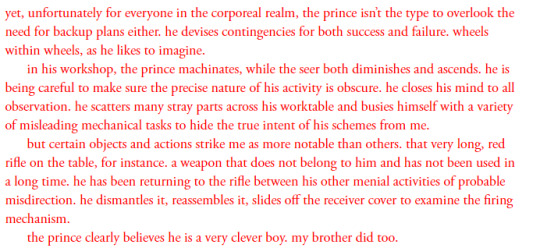
I do so very much like where this is going. It would seem that we will soon find out precisely what Dirk is planning. “Diminishes and ascends” has an interesting ring to it, as well. That red rifle: Is it the one that launches portals? Honestly, Dirk is indeed quite clever, by the way. He has the seeds of great potential. It’s simply that it has not fully bloomed, yet, and he is a little bit overly full of himself, and arrogant in what he believes he can do. And yes, he is indeed temperamental when people interfere with his plans, it seems.

There’s the scheming politician we’ve all been waiting for. Way to go, thinking in such calculated manners and considering backstabbing ones you care about, Jane. Somewhat petty, and certainly rather dangerous, all things considered (things are a bit more explosive, where gods are involved), but closer to the political ideal which I would hope for if she were to be portrayed as competent. (Of course, I am actually disgusted with that sort of behavior. It’s one of the things I dislike about politics. I’ll recognize that it at least paints her in a slightly better light than the previous samplings of her thought process and tactical capacity has; thus, I generally like and dislike where this is going.)

Yep. Angelic purity with sexual potency/desire. There has always been this sort of tension in Hope’s nature. Just like the fact that angels are, in Biblical texts, both symbols of terror and destruction as well as hope and salvation. All (almost all?) the important positive interactions with heavenly beings start with fear on the part of mortals, followed by a “Fear not!” to suggest they come in peace. Otherwise, they come bringing judgment and wrath, and thus don’t tend to bother much with formalities.

Is that sarcasm, Jane? If not, there’s certainly a heavy layer of irony. Do remember what just happened with Jane when she invited Jape Jake over for a friendly visit, not too long ago, my good audience members.
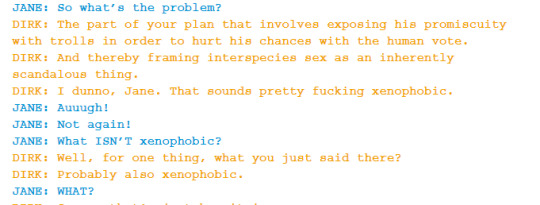
... ***twitches, and tries very hard to hold in the inappropriate laughter***

If only I had someone so dependable to tell me when I was not dwelling far enough into the land of Always Woke. Perhaps then I would be able to avoid the inevitable scandals that would result from Foot-in-the-Mouth-itis. Oh, wait, no politician can avoid being attacked for various probably minor accidents on their part as the populace naturally over-reacts to what honestly may not actually reflect their character so much as them being accident prone or ignorant? What’s that about manipulation of audio/video recordings for the sake of generating useful sound bites that might be used in an attempt to impugn the honor of any prospective candidate? Oh. I see. Thank you for that important bit of knowledge that I otherwise might not have had access to, imaginary adviser. (Note: I do not actually believe that one should try to be as careful as possible with regards to what one says; nor that one should ignore or scorn important social issues. I am utilizing exaggeration and mockery for the sake of comedy.) ... Alt!Calliope’s description of Dirk holding the rifle is quite elegant and beautiful.

This is indeed a beautiful irony, seeing the situation with regards to Dirk and Alt!Calliope’s tendencies toward bias being reversed.

***snickers*** Magnifique.

It is strange to see Alt!Calliope teasing and egging him on. It may be unintentional. Hard to say.
#Homestuck Epilogue#Political Theory#Homestuck Spoilers#Homestuck Liveblog#The Lollipop Juju#I can't believe all my previous taggings of that Juju were spelled incorrectly#apparently.#Is that how the suggested tag function works?#Jane Crocker#Dirk Strider#Alt!Calliope#Alt Calliope#Alternate Calliope#Irony#Juju#The Ultimate Juju#Strategy#Political Strategy#Swing Voter Alienation#Swing Voters#Trickster Mode
10 notes
·
View notes